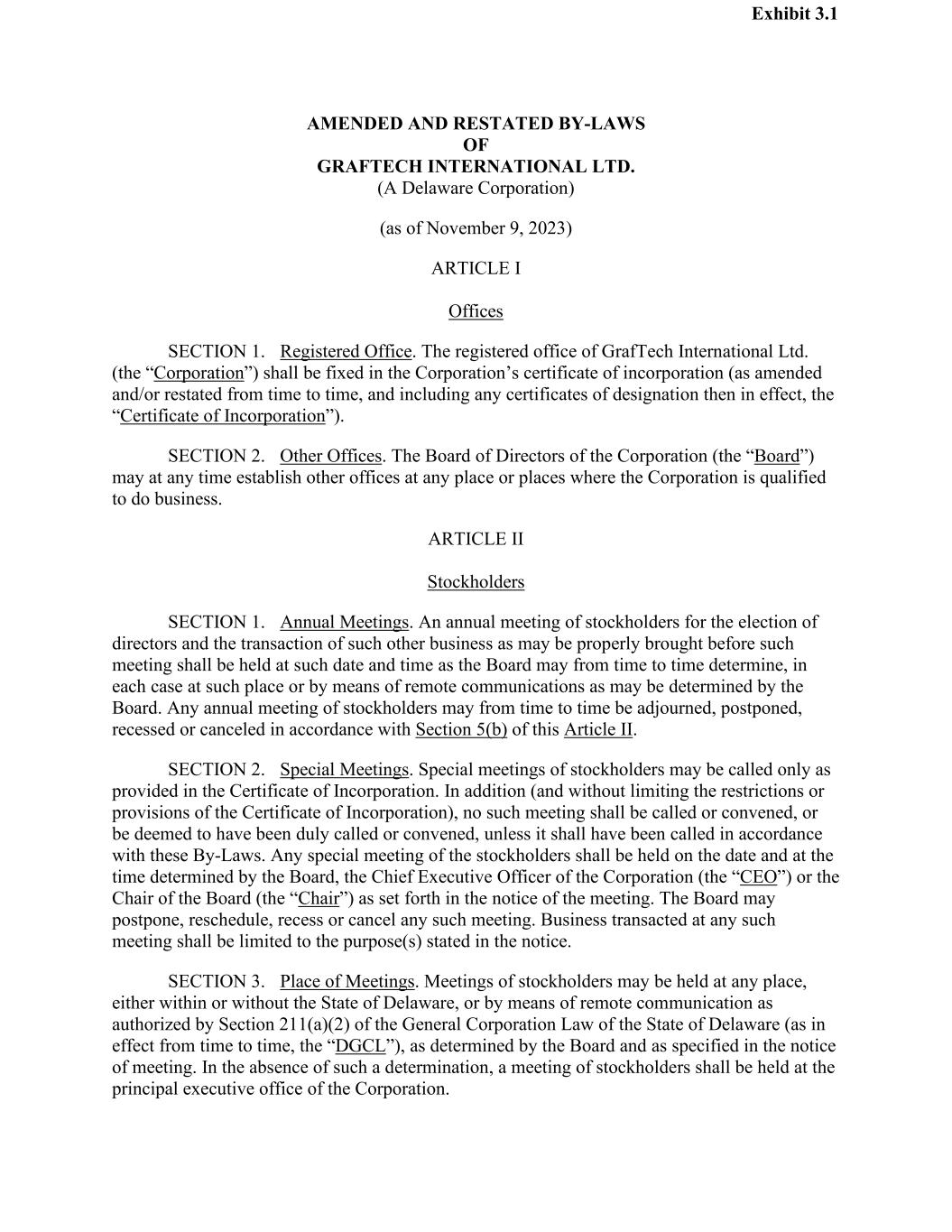
AMENDED AND RESTATED BY-LAWS OF GRAFTECH INTERNATIONAL LTD. (A Delaware Corporation) (as of November 9, 2023) ARTICLE I Offices SECTION 1. Registered Office. The registered office of GrafTech International Ltd. (the “Corporation”) shall be fixed in the Corporation’s certificate of incorporation (as amended and/or restated from time to time, and including any certificates of designation then in effect, the “Certificate of Incorporation”). SECTION 2. Other Offices. The Board of Directors of the Corporation (the “Board”) may at any time establish other offices at any place or places where the Corporation is qualified to do business. ARTICLE II Stockholders SECTION 1. Annual Meetings. An annual meeting of stockholders for the election of directors and the transaction of such other business as may be properly brought before such meeting shall be held at such date and time as the Board may from time to time determine, in each case at such place or by means of remote communications as may be determined by the Board. Any annual meeting of stockholders may from time to time be adjourned, postponed, recessed or canceled in accordance with Section 5(b) of this Article II. SECTION 2. Special Meetings. Special meetings of stockholders may be called only as provided in the Certificate of Incorporation. In addition (and without limiting the restrictions or provisions of the Certificate of Incorporation), no such meeting shall be called or convened, or be deemed to have been duly called or convened, unless it shall have been called in accordance with these By-Laws. Any special meeting of the stockholders shall be held on the date and at the time determined by the Board, the Chief Executive Officer of the Corporation (the “CEO”) or the Chair of the Board (the “Chair”) as set forth in the notice of the meeting. The Board may postpone, reschedule, recess or cancel any such meeting. Business transacted at any such meeting shall be limited to the purpose(s) stated in the notice. SECTION 3. Place of Meetings. Meetings of stockholders may be held at any place, either within or without the State of Delaware, or by means of remote communication as authorized by Section 211(a)(2) of the General Corporation Law of the State of Delaware (as in effect from time to time, the “DGCL”), as determined by the Board and as specified in the notice of meeting. In the absence of such a determination, a meeting of stockholders shall be held at the principal executive office of the Corporation. Exhibit 3.1
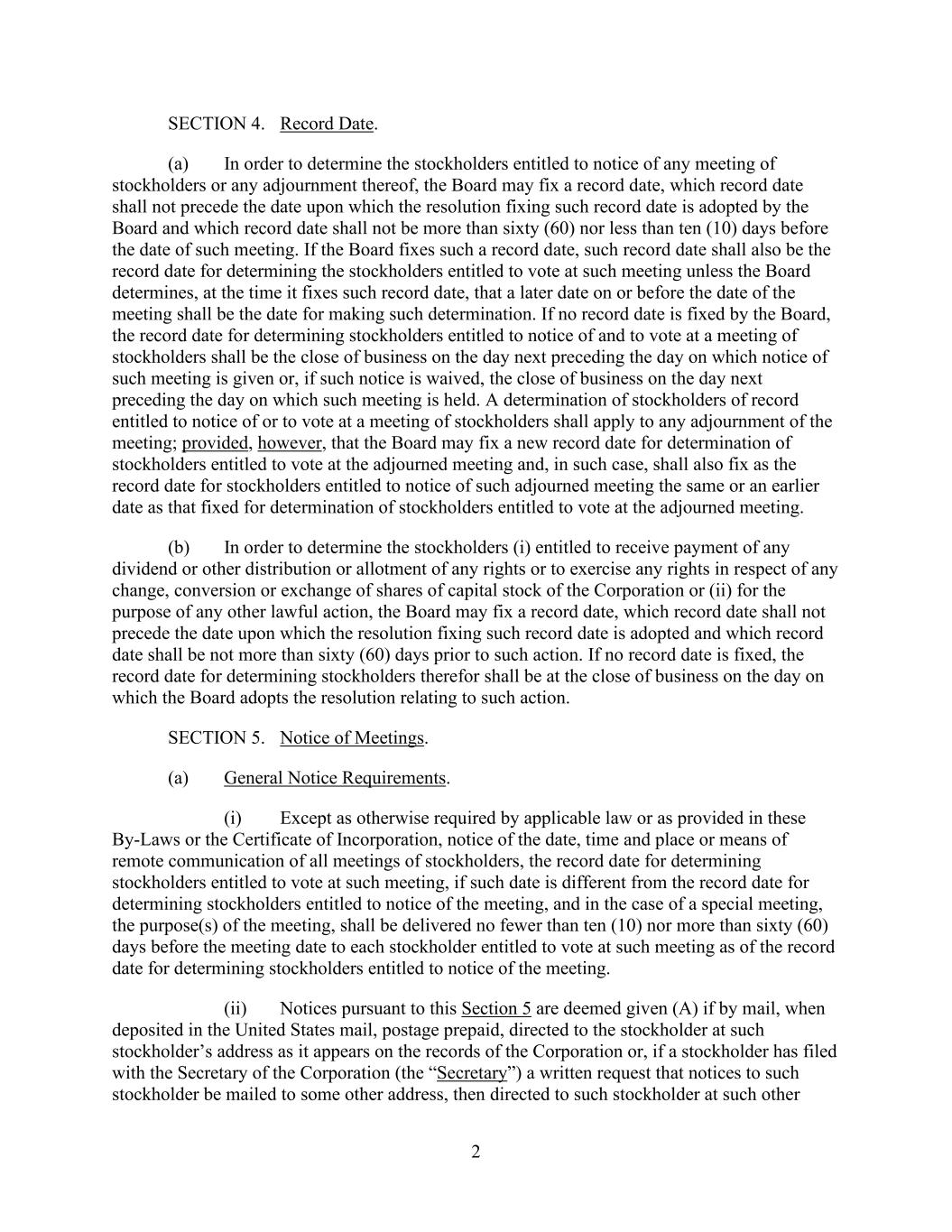
2 SECTION 4. Record Date. (a) In order to determine the stockholders entitled to notice of any meeting of stockholders or any adjournment thereof, the Board may fix a record date, which record date shall not precede the date upon which the resolution fixing such record date is adopted by the Board and which record date shall not be more than sixty (60) nor less than ten (10) days before the date of such meeting. If the Board fixes such a record date, such record date shall also be the record date for determining the stockholders entitled to vote at such meeting unless the Board determines, at the time it fixes such record date, that a later date on or before the date of the meeting shall be the date for making such determination. If no record date is fixed by the Board, the record date for determining stockholders entitled to notice of and to vote at a meeting of stockholders shall be the close of business on the day next preceding the day on which notice of such meeting is given or, if such notice is waived, the close of business on the day next preceding the day on which such meeting is held. A determination of stockholders of record entitled to notice of or to vote at a meeting of stockholders shall apply to any adjournment of the meeting; provided, however, that the Board may fix a new record date for determination of stockholders entitled to vote at the adjourned meeting and, in such case, shall also fix as the record date for stockholders entitled to notice of such adjourned meeting the same or an earlier date as that fixed for determination of stockholders entitled to vote at the adjourned meeting. (b) In order to determine the stockholders (i) entitled to receive payment of any dividend or other distribution or allotment of any rights or to exercise any rights in respect of any change, conversion or exchange of shares of capital stock of the Corporation or (ii) for the purpose of any other lawful action, the Board may fix a record date, which record date shall not precede the date upon which the resolution fixing such record date is adopted and which record date shall be not more than sixty (60) days prior to such action. If no record date is fixed, the record date for determining stockholders therefor shall be at the close of business on the day on which the Board adopts the resolution relating to such action. SECTION 5. Notice of Meetings. (a) General Notice Requirements. (i) Except as otherwise required by applicable law or as provided in these By-Laws or the Certificate of Incorporation, notice of the date, time and place or means of remote communication of all meetings of stockholders, the record date for determining stockholders entitled to vote at such meeting, if such date is different from the record date for determining stockholders entitled to notice of the meeting, and in the case of a special meeting, the purpose(s) of the meeting, shall be delivered no fewer than ten (10) nor more than sixty (60) days before the meeting date to each stockholder entitled to vote at such meeting as of the record date for determining stockholders entitled to notice of the meeting. (ii) Notices pursuant to this Section 5 are deemed given (A) if by mail, when deposited in the United States mail, postage prepaid, directed to the stockholder at such stockholder’s address as it appears on the records of the Corporation or, if a stockholder has filed with the Secretary of the Corporation (the “Secretary”) a written request that notices to such stockholder be mailed to some other address, then directed to such stockholder at such other
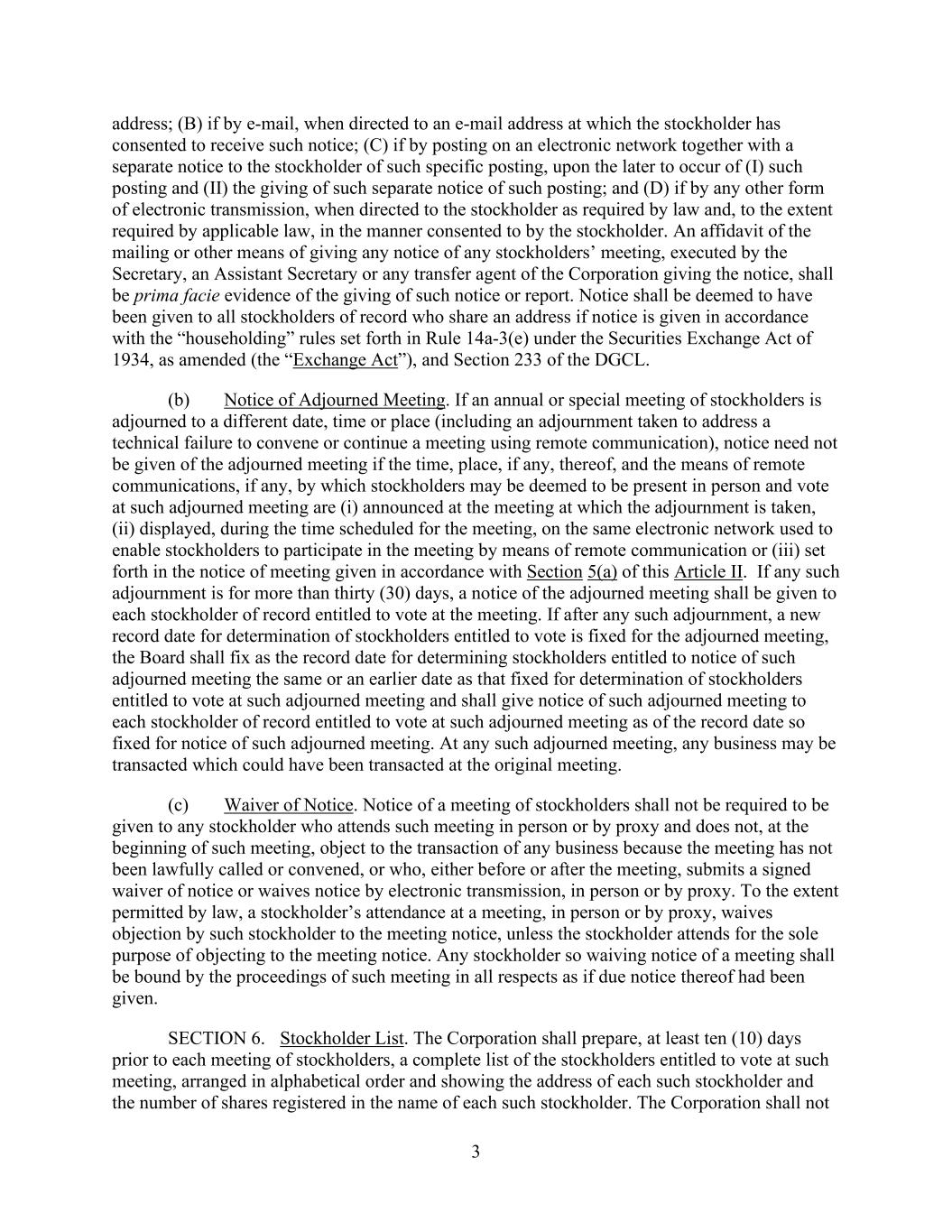
3 address; (B) if by e-mail, when directed to an e-mail address at which the stockholder has consented to receive such notice; (C) if by posting on an electronic network together with a separate notice to the stockholder of such specific posting, upon the later to occur of (I) such posting and (II) the giving of such separate notice of such posting; and (D) if by any other form of electronic transmission, when directed to the stockholder as required by law and, to the extent required by applicable law, in the manner consented to by the stockholder. An affidavit of the mailing or other means of giving any notice of any stockholders’ meeting, executed by the Secretary, an Assistant Secretary or any transfer agent of the Corporation giving the notice, shall be prima facie evidence of the giving of such notice or report. Notice shall be deemed to have been given to all stockholders of record who share an address if notice is given in accordance with the “householding” rules set forth in Rule 14a-3(e) under the Securities Exchange Act of 1934, as amended (the “Exchange Act”), and Section 233 of the DGCL. (b) Notice of Adjourned Meeting. If an annual or special meeting of stockholders is adjourned to a different date, time or place (including an adjournment taken to address a technical failure to convene or continue a meeting using remote communication), notice need not be given of the adjourned meeting if the time, place, if any, thereof, and the means of remote communications, if any, by which stockholders may be deemed to be present in person and vote at such adjourned meeting are (i) announced at the meeting at which the adjournment is taken, (ii) displayed, during the time scheduled for the meeting, on the same electronic network used to enable stockholders to participate in the meeting by means of remote communication or (iii) set forth in the notice of meeting given in accordance with Section 5(a) of this Article II. If any such adjournment is for more than thirty (30) days, a notice of the adjourned meeting shall be given to each stockholder of record entitled to vote at the meeting. If after any such adjournment, a new record date for determination of stockholders entitled to vote is fixed for the adjourned meeting, the Board shall fix as the record date for determining stockholders entitled to notice of such adjourned meeting the same or an earlier date as that fixed for determination of stockholders entitled to vote at such adjourned meeting and shall give notice of such adjourned meeting to each stockholder of record entitled to vote at such adjourned meeting as of the record date so fixed for notice of such adjourned meeting. At any such adjourned meeting, any business may be transacted which could have been transacted at the original meeting. (c) Waiver of Notice. Notice of a meeting of stockholders shall not be required to be given to any stockholder who attends such meeting in person or by proxy and does not, at the beginning of such meeting, object to the transaction of any business because the meeting has not been lawfully called or convened, or who, either before or after the meeting, submits a signed waiver of notice or waives notice by electronic transmission, in person or by proxy. To the extent permitted by law, a stockholder’s attendance at a meeting, in person or by proxy, waives objection by such stockholder to the meeting notice, unless the stockholder attends for the sole purpose of objecting to the meeting notice. Any stockholder so waiving notice of a meeting shall be bound by the proceedings of such meeting in all respects as if due notice thereof had been given. SECTION 6. Stockholder List. The Corporation shall prepare, at least ten (10) days prior to each meeting of stockholders, a complete list of the stockholders entitled to vote at such meeting, arranged in alphabetical order and showing the address of each such stockholder and the number of shares registered in the name of each such stockholder. The Corporation shall not
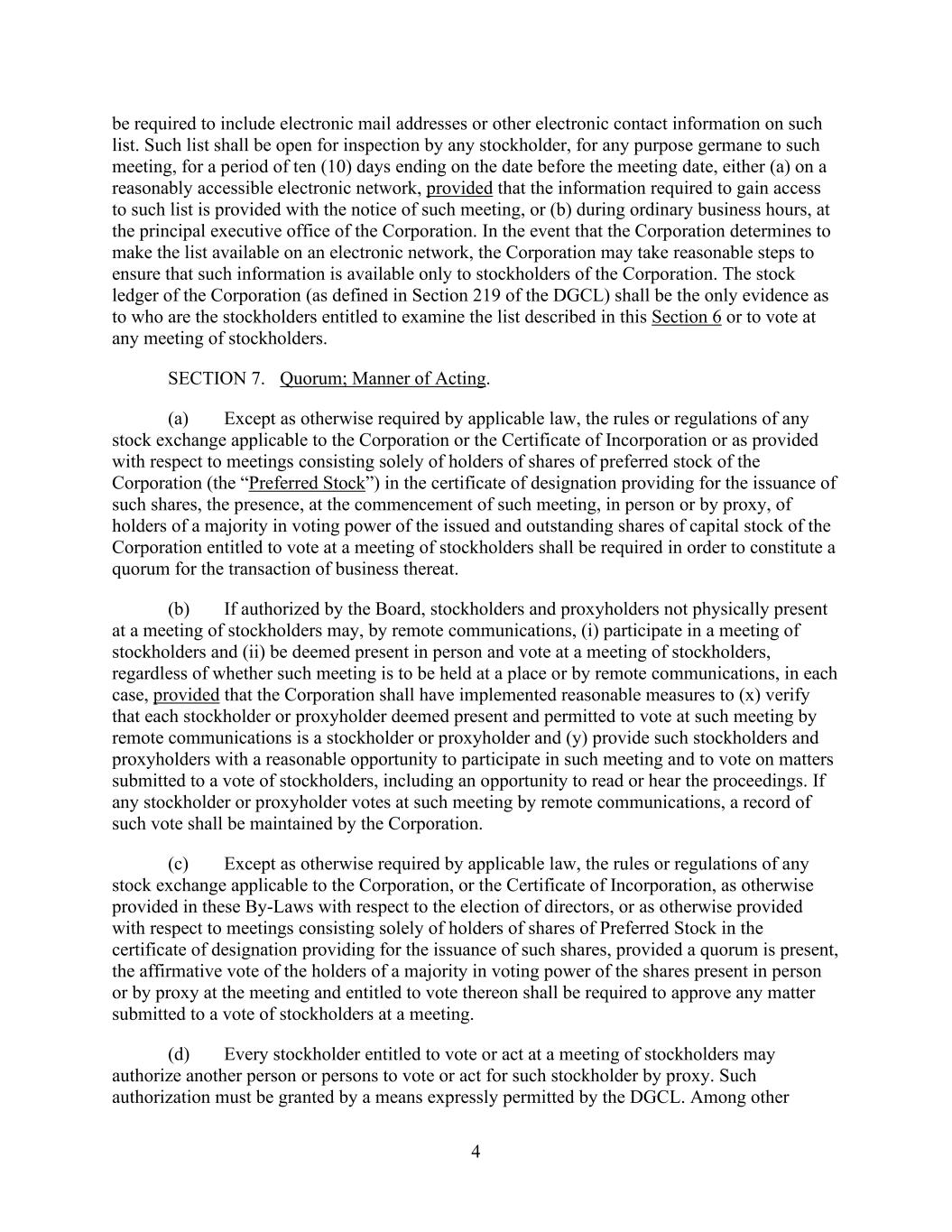
4 be required to include electronic mail addresses or other electronic contact information on such list. Such list shall be open for inspection by any stockholder, for any purpose germane to such meeting, for a period of ten (10) days ending on the date before the meeting date, either (a) on a reasonably accessible electronic network, provided that the information required to gain access to such list is provided with the notice of such meeting, or (b) during ordinary business hours, at the principal executive office of the Corporation. In the event that the Corporation determines to make the list available on an electronic network, the Corporation may take reasonable steps to ensure that such information is available only to stockholders of the Corporation. The stock ledger of the Corporation (as defined in Section 219 of the DGCL) shall be the only evidence as to who are the stockholders entitled to examine the list described in this Section 6 or to vote at any meeting of stockholders. SECTION 7. Quorum; Manner of Acting. (a) Except as otherwise required by applicable law, the rules or regulations of any stock exchange applicable to the Corporation or the Certificate of Incorporation or as provided with respect to meetings consisting solely of holders of shares of preferred stock of the Corporation (the “Preferred Stock”) in the certificate of designation providing for the issuance of such shares, the presence, at the commencement of such meeting, in person or by proxy, of holders of a majority in voting power of the issued and outstanding shares of capital stock of the Corporation entitled to vote at a meeting of stockholders shall be required in order to constitute a quorum for the transaction of business thereat. (b) If authorized by the Board, stockholders and proxyholders not physically present at a meeting of stockholders may, by remote communications, (i) participate in a meeting of stockholders and (ii) be deemed present in person and vote at a meeting of stockholders, regardless of whether such meeting is to be held at a place or by remote communications, in each case, provided that the Corporation shall have implemented reasonable measures to (x) verify that each stockholder or proxyholder deemed present and permitted to vote at such meeting by remote communications is a stockholder or proxyholder and (y) provide such stockholders and proxyholders with a reasonable opportunity to participate in such meeting and to vote on matters submitted to a vote of stockholders, including an opportunity to read or hear the proceedings. If any stockholder or proxyholder votes at such meeting by remote communications, a record of such vote shall be maintained by the Corporation. (c) Except as otherwise required by applicable law, the rules or regulations of any stock exchange applicable to the Corporation, or the Certificate of Incorporation, as otherwise provided in these By-Laws with respect to the election of directors, or as otherwise provided with respect to meetings consisting solely of holders of shares of Preferred Stock in the certificate of designation providing for the issuance of such shares, provided a quorum is present, the affirmative vote of the holders of a majority in voting power of the shares present in person or by proxy at the meeting and entitled to vote thereon shall be required to approve any matter submitted to a vote of stockholders at a meeting. (d) Every stockholder entitled to vote or act at a meeting of stockholders may authorize another person or persons to vote or act for such stockholder by proxy. Such authorization must be granted by a means expressly permitted by the DGCL. Among other
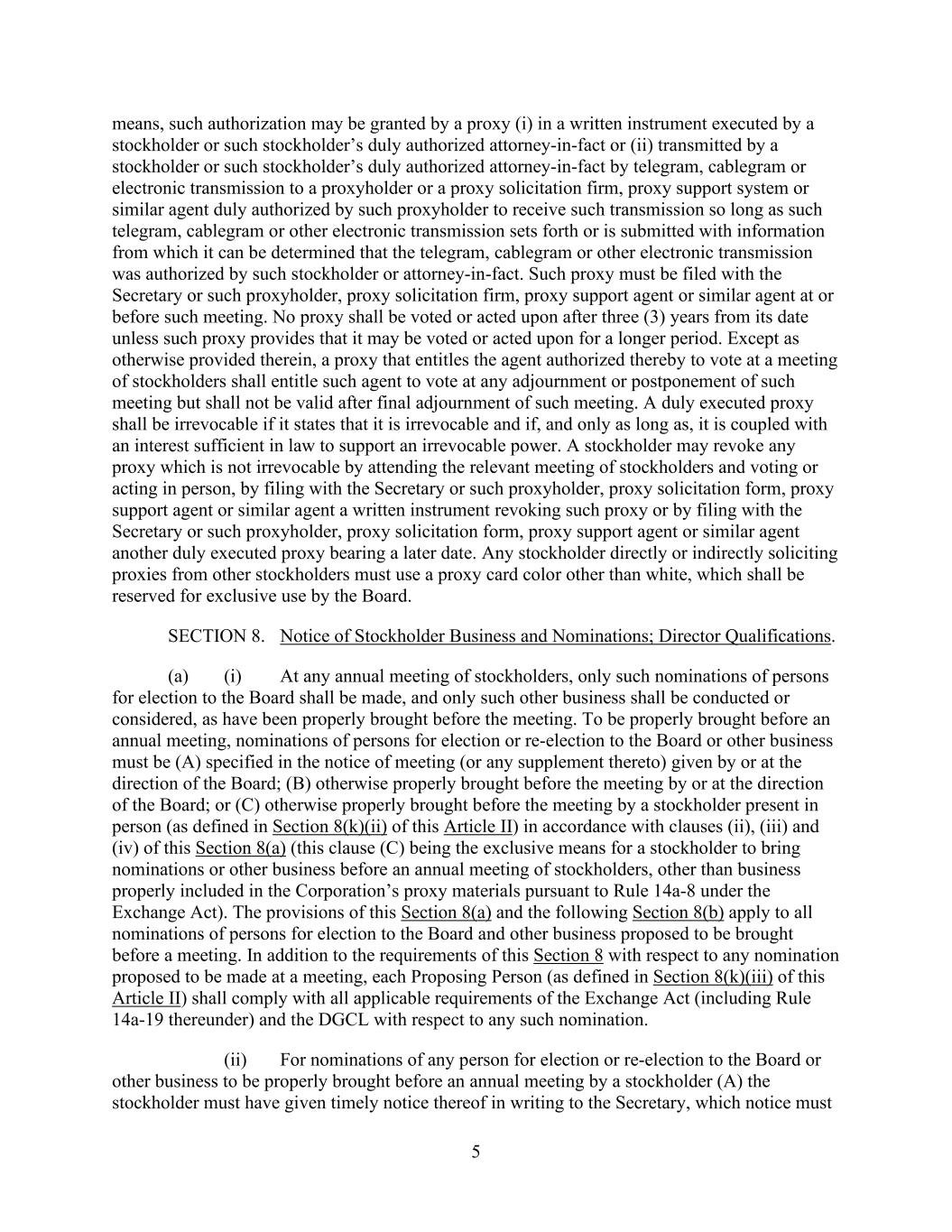
5 means, such authorization may be granted by a proxy (i) in a written instrument executed by a stockholder or such stockholder’s duly authorized attorney-in-fact or (ii) transmitted by a stockholder or such stockholder’s duly authorized attorney-in-fact by telegram, cablegram or electronic transmission to a proxyholder or a proxy solicitation firm, proxy support system or similar agent duly authorized by such proxyholder to receive such transmission so long as such telegram, cablegram or other electronic transmission sets forth or is submitted with information from which it can be determined that the telegram, cablegram or other electronic transmission was authorized by such stockholder or attorney-in-fact. Such proxy must be filed with the Secretary or such proxyholder, proxy solicitation firm, proxy support agent or similar agent at or before such meeting. No proxy shall be voted or acted upon after three (3) years from its date unless such proxy provides that it may be voted or acted upon for a longer period. Except as otherwise provided therein, a proxy that entitles the agent authorized thereby to vote at a meeting of stockholders shall entitle such agent to vote at any adjournment or postponement of such meeting but shall not be valid after final adjournment of such meeting. A duly executed proxy shall be irrevocable if it states that it is irrevocable and if, and only as long as, it is coupled with an interest sufficient in law to support an irrevocable power. A stockholder may revoke any proxy which is not irrevocable by attending the relevant meeting of stockholders and voting or acting in person, by filing with the Secretary or such proxyholder, proxy solicitation form, proxy support agent or similar agent a written instrument revoking such proxy or by filing with the Secretary or such proxyholder, proxy solicitation form, proxy support agent or similar agent another duly executed proxy bearing a later date. Any stockholder directly or indirectly soliciting proxies from other stockholders must use a proxy card color other than white, which shall be reserved for exclusive use by the Board. SECTION 8. Notice of Stockholder Business and Nominations; Director Qualifications. (a) (i) At any annual meeting of stockholders, only such nominations of persons for election to the Board shall be made, and only such other business shall be conducted or considered, as have been properly brought before the meeting. To be properly brought before an annual meeting, nominations of persons for election or re-election to the Board or other business must be (A) specified in the notice of meeting (or any supplement thereto) given by or at the direction of the Board; (B) otherwise properly brought before the meeting by or at the direction of the Board; or (C) otherwise properly brought before the meeting by a stockholder present in person (as defined in Section 8(k)(ii) of this Article II) in accordance with clauses (ii), (iii) and (iv) of this Section 8(a) (this clause (C) being the exclusive means for a stockholder to bring nominations or other business before an annual meeting of stockholders, other than business properly included in the Corporation’s proxy materials pursuant to Rule 14a-8 under the Exchange Act). The provisions of this Section 8(a) and the following Section 8(b) apply to all nominations of persons for election to the Board and other business proposed to be brought before a meeting. In addition to the requirements of this Section 8 with respect to any nomination proposed to be made at a meeting, each Proposing Person (as defined in Section 8(k)(iii) of this Article II) shall comply with all applicable requirements of the Exchange Act (including Rule 14a-19 thereunder) and the DGCL with respect to any such nomination. (ii) For nominations of any person for election or re-election to the Board or other business to be properly brought before an annual meeting by a stockholder (A) the stockholder must have given timely notice thereof in writing to the Secretary, which notice must
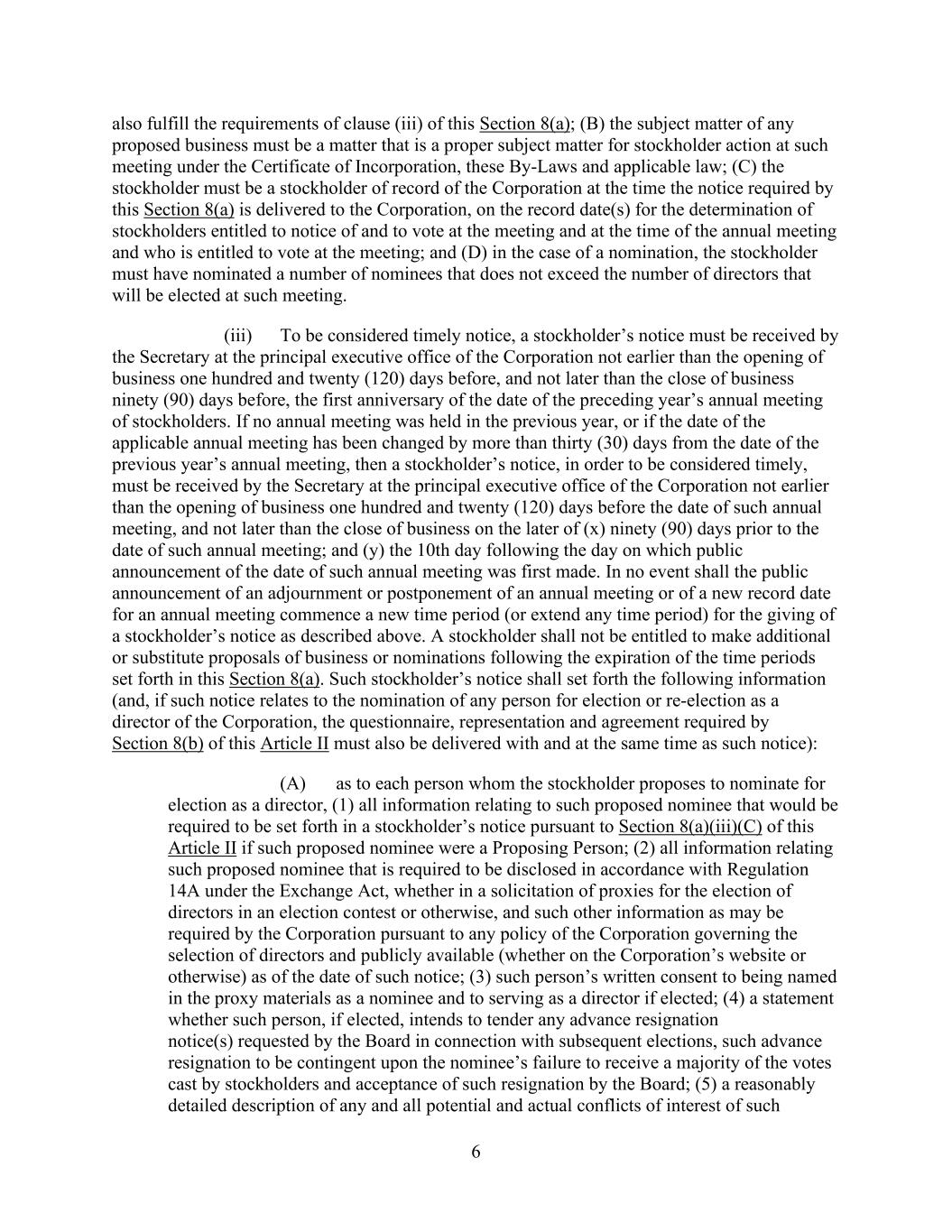
6 also fulfill the requirements of clause (iii) of this Section 8(a); (B) the subject matter of any proposed business must be a matter that is a proper subject matter for stockholder action at such meeting under the Certificate of Incorporation, these By-Laws and applicable law; (C) the stockholder must be a stockholder of record of the Corporation at the time the notice required by this Section 8(a) is delivered to the Corporation, on the record date(s) for the determination of stockholders entitled to notice of and to vote at the meeting and at the time of the annual meeting and who is entitled to vote at the meeting; and (D) in the case of a nomination, the stockholder must have nominated a number of nominees that does not exceed the number of directors that will be elected at such meeting. (iii) To be considered timely notice, a stockholder’s notice must be received by the Secretary at the principal executive office of the Corporation not earlier than the opening of business one hundred and twenty (120) days before, and not later than the close of business ninety (90) days before, the first anniversary of the date of the preceding year’s annual meeting of stockholders. If no annual meeting was held in the previous year, or if the date of the applicable annual meeting has been changed by more than thirty (30) days from the date of the previous year’s annual meeting, then a stockholder’s notice, in order to be considered timely, must be received by the Secretary at the principal executive office of the Corporation not earlier than the opening of business one hundred and twenty (120) days before the date of such annual meeting, and not later than the close of business on the later of (x) ninety (90) days prior to the date of such annual meeting; and (y) the 10th day following the day on which public announcement of the date of such annual meeting was first made. In no event shall the public announcement of an adjournment or postponement of an annual meeting or of a new record date for an annual meeting commence a new time period (or extend any time period) for the giving of a stockholder’s notice as described above. A stockholder shall not be entitled to make additional or substitute proposals of business or nominations following the expiration of the time periods set forth in this Section 8(a). Such stockholder’s notice shall set forth the following information (and, if such notice relates to the nomination of any person for election or re-election as a director of the Corporation, the questionnaire, representation and agreement required by Section 8(b) of this Article II must also be delivered with and at the same time as such notice): (A) as to each person whom the stockholder proposes to nominate for election as a director, (1) all information relating to such proposed nominee that would be required to be set forth in a stockholder’s notice pursuant to Section 8(a)(iii)(C) of this Article II if such proposed nominee were a Proposing Person; (2) all information relating such proposed nominee that is required to be disclosed in accordance with Regulation 14A under the Exchange Act, whether in a solicitation of proxies for the election of directors in an election contest or otherwise, and such other information as may be required by the Corporation pursuant to any policy of the Corporation governing the selection of directors and publicly available (whether on the Corporation’s website or otherwise) as of the date of such notice; (3) such person’s written consent to being named in the proxy materials as a nominee and to serving as a director if elected; (4) a statement whether such person, if elected, intends to tender any advance resignation notice(s) requested by the Board in connection with subsequent elections, such advance resignation to be contingent upon the nominee’s failure to receive a majority of the votes cast by stockholders and acceptance of such resignation by the Board; (5) a reasonably detailed description of any and all potential and actual conflicts of interest of such
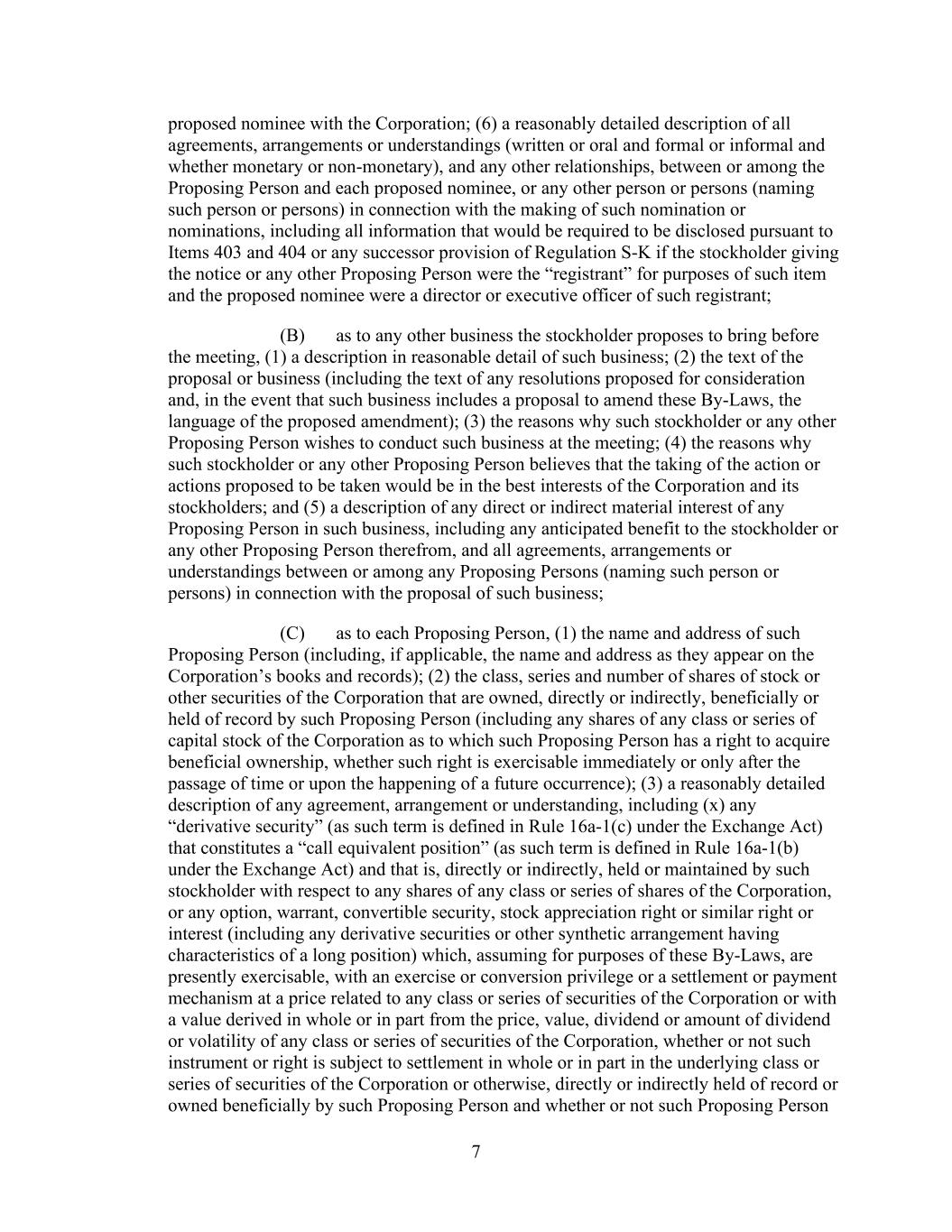
7 proposed nominee with the Corporation; (6) a reasonably detailed description of all agreements, arrangements or understandings (written or oral and formal or informal and whether monetary or non-monetary), and any other relationships, between or among the Proposing Person and each proposed nominee, or any other person or persons (naming such person or persons) in connection with the making of such nomination or nominations, including all information that would be required to be disclosed pursuant to Items 403 and 404 or any successor provision of Regulation S-K if the stockholder giving the notice or any other Proposing Person were the “registrant” for purposes of such item and the proposed nominee were a director or executive officer of such registrant; (B) as to any other business the stockholder proposes to bring before the meeting, (1) a description in reasonable detail of such business; (2) the text of the proposal or business (including the text of any resolutions proposed for consideration and, in the event that such business includes a proposal to amend these By-Laws, the language of the proposed amendment); (3) the reasons why such stockholder or any other Proposing Person wishes to conduct such business at the meeting; (4) the reasons why such stockholder or any other Proposing Person believes that the taking of the action or actions proposed to be taken would be in the best interests of the Corporation and its stockholders; and (5) a description of any direct or indirect material interest of any Proposing Person in such business, including any anticipated benefit to the stockholder or any other Proposing Person therefrom, and all agreements, arrangements or understandings between or among any Proposing Persons (naming such person or persons) in connection with the proposal of such business; (C) as to each Proposing Person, (1) the name and address of such Proposing Person (including, if applicable, the name and address as they appear on the Corporation’s books and records); (2) the class, series and number of shares of stock or other securities of the Corporation that are owned, directly or indirectly, beneficially or held of record by such Proposing Person (including any shares of any class or series of capital stock of the Corporation as to which such Proposing Person has a right to acquire beneficial ownership, whether such right is exercisable immediately or only after the passage of time or upon the happening of a future occurrence); (3) a reasonably detailed description of any agreement, arrangement or understanding, including (x) any “derivative security” (as such term is defined in Rule 16a-1(c) under the Exchange Act) that constitutes a “call equivalent position” (as such term is defined in Rule 16a-1(b) under the Exchange Act) and that is, directly or indirectly, held or maintained by such stockholder with respect to any shares of any class or series of shares of the Corporation, or any option, warrant, convertible security, stock appreciation right or similar right or interest (including any derivative securities or other synthetic arrangement having characteristics of a long position) which, assuming for purposes of these By-Laws, are presently exercisable, with an exercise or conversion privilege or a settlement or payment mechanism at a price related to any class or series of securities of the Corporation or with a value derived in whole or in part from the price, value, dividend or amount of dividend or volatility of any class or series of securities of the Corporation, whether or not such instrument or right is subject to settlement in whole or in part in the underlying class or series of securities of the Corporation or otherwise, directly or indirectly held of record or owned beneficially by such Proposing Person and whether or not such Proposing Person
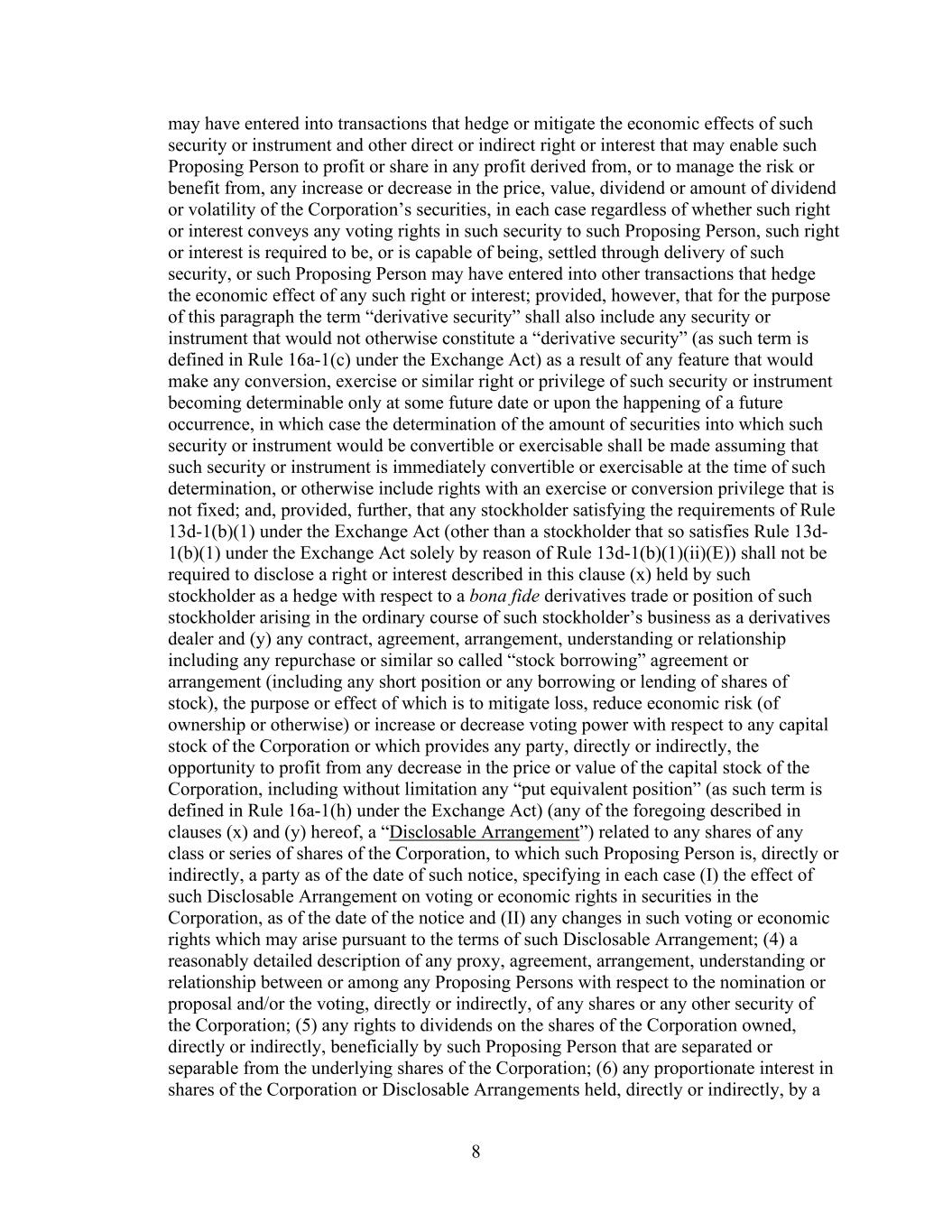
8 may have entered into transactions that hedge or mitigate the economic effects of such security or instrument and other direct or indirect right or interest that may enable such Proposing Person to profit or share in any profit derived from, or to manage the risk or benefit from, any increase or decrease in the price, value, dividend or amount of dividend or volatility of the Corporation’s securities, in each case regardless of whether such right or interest conveys any voting rights in such security to such Proposing Person, such right or interest is required to be, or is capable of being, settled through delivery of such security, or such Proposing Person may have entered into other transactions that hedge the economic effect of any such right or interest; provided, however, that for the purpose of this paragraph the term “derivative security” shall also include any security or instrument that would not otherwise constitute a “derivative security” (as such term is defined in Rule 16a-1(c) under the Exchange Act) as a result of any feature that would make any conversion, exercise or similar right or privilege of such security or instrument becoming determinable only at some future date or upon the happening of a future occurrence, in which case the determination of the amount of securities into which such security or instrument would be convertible or exercisable shall be made assuming that such security or instrument is immediately convertible or exercisable at the time of such determination, or otherwise include rights with an exercise or conversion privilege that is not fixed; and, provided, further, that any stockholder satisfying the requirements of Rule 13d-1(b)(1) under the Exchange Act (other than a stockholder that so satisfies Rule 13d- 1(b)(1) under the Exchange Act solely by reason of Rule 13d-1(b)(1)(ii)(E)) shall not be required to disclose a right or interest described in this clause (x) held by such stockholder as a hedge with respect to a bona fide derivatives trade or position of such stockholder arising in the ordinary course of such stockholder’s business as a derivatives dealer and (y) any contract, agreement, arrangement, understanding or relationship including any repurchase or similar so called “stock borrowing” agreement or arrangement (including any short position or any borrowing or lending of shares of stock), the purpose or effect of which is to mitigate loss, reduce economic risk (of ownership or otherwise) or increase or decrease voting power with respect to any capital stock of the Corporation or which provides any party, directly or indirectly, the opportunity to profit from any decrease in the price or value of the capital stock of the Corporation, including without limitation any “put equivalent position” (as such term is defined in Rule 16a-1(h) under the Exchange Act) (any of the foregoing described in clauses (x) and (y) hereof, a “Disclosable Arrangement”) related to any shares of any class or series of shares of the Corporation, to which such Proposing Person is, directly or indirectly, a party as of the date of such notice, specifying in each case (I) the effect of such Disclosable Arrangement on voting or economic rights in securities in the Corporation, as of the date of the notice and (II) any changes in such voting or economic rights which may arise pursuant to the terms of such Disclosable Arrangement; (4) a reasonably detailed description of any proxy, agreement, arrangement, understanding or relationship between or among any Proposing Persons with respect to the nomination or proposal and/or the voting, directly or indirectly, of any shares or any other security of the Corporation; (5) any rights to dividends on the shares of the Corporation owned, directly or indirectly, beneficially by such Proposing Person that are separated or separable from the underlying shares of the Corporation; (6) any proportionate interest in shares of the Corporation or Disclosable Arrangements held, directly or indirectly, by a
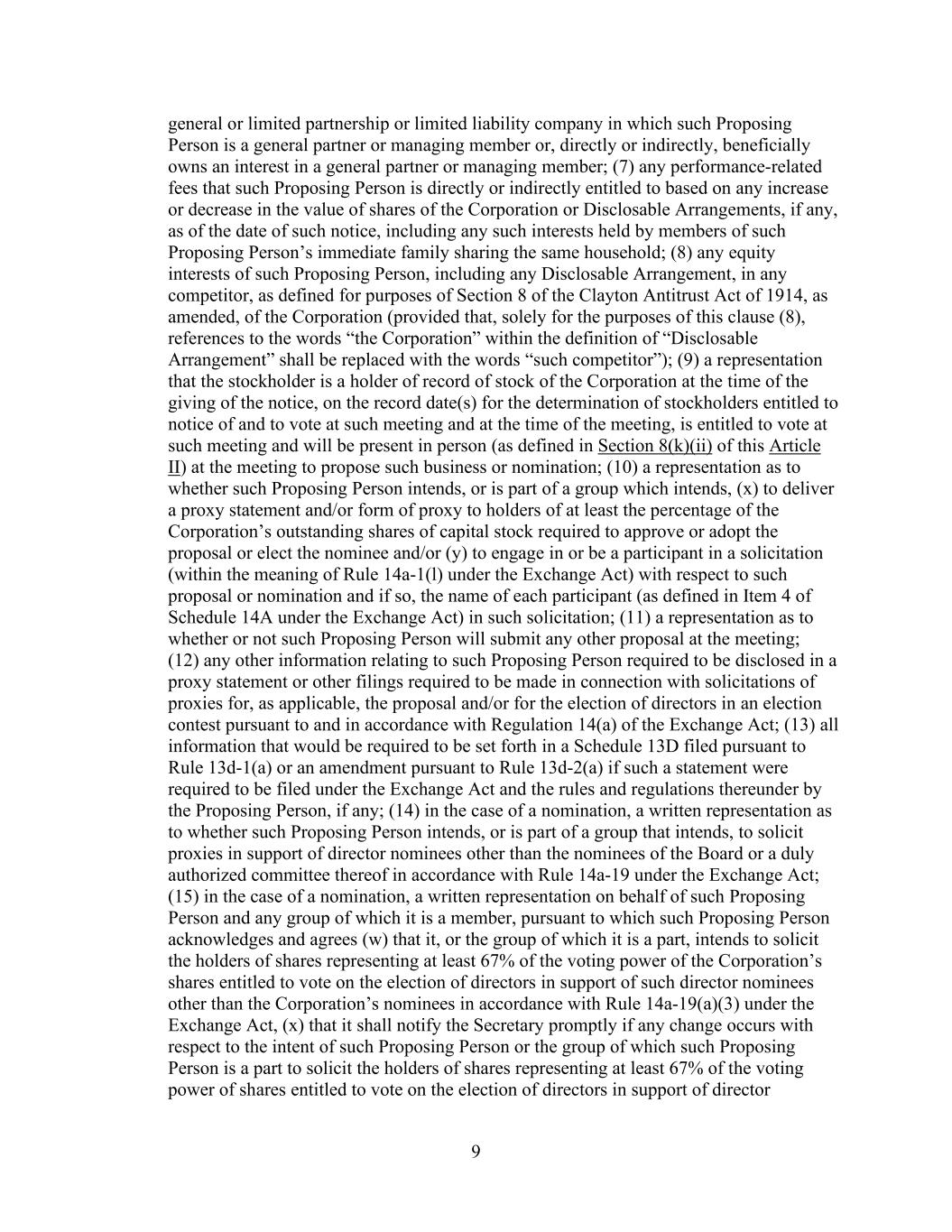
9 general or limited partnership or limited liability company in which such Proposing Person is a general partner or managing member or, directly or indirectly, beneficially owns an interest in a general partner or managing member; (7) any performance-related fees that such Proposing Person is directly or indirectly entitled to based on any increase or decrease in the value of shares of the Corporation or Disclosable Arrangements, if any, as of the date of such notice, including any such interests held by members of such Proposing Person’s immediate family sharing the same household; (8) any equity interests of such Proposing Person, including any Disclosable Arrangement, in any competitor, as defined for purposes of Section 8 of the Clayton Antitrust Act of 1914, as amended, of the Corporation (provided that, solely for the purposes of this clause (8), references to the words “the Corporation” within the definition of “Disclosable Arrangement” shall be replaced with the words “such competitor”); (9) a representation that the stockholder is a holder of record of stock of the Corporation at the time of the giving of the notice, on the record date(s) for the determination of stockholders entitled to notice of and to vote at such meeting and at the time of the meeting, is entitled to vote at such meeting and will be present in person (as defined in Section 8(k)(ii) of this Article II) at the meeting to propose such business or nomination; (10) a representation as to whether such Proposing Person intends, or is part of a group which intends, (x) to deliver a proxy statement and/or form of proxy to holders of at least the percentage of the Corporation’s outstanding shares of capital stock required to approve or adopt the proposal or elect the nominee and/or (y) to engage in or be a participant in a solicitation (within the meaning of Rule 14a-1(l) under the Exchange Act) with respect to such proposal or nomination and if so, the name of each participant (as defined in Item 4 of Schedule 14A under the Exchange Act) in such solicitation; (11) a representation as to whether or not such Proposing Person will submit any other proposal at the meeting; (12) any other information relating to such Proposing Person required to be disclosed in a proxy statement or other filings required to be made in connection with solicitations of proxies for, as applicable, the proposal and/or for the election of directors in an election contest pursuant to and in accordance with Regulation 14(a) of the Exchange Act; (13) all information that would be required to be set forth in a Schedule 13D filed pursuant to Rule 13d-1(a) or an amendment pursuant to Rule 13d-2(a) if such a statement were required to be filed under the Exchange Act and the rules and regulations thereunder by the Proposing Person, if any; (14) in the case of a nomination, a written representation as to whether such Proposing Person intends, or is part of a group that intends, to solicit proxies in support of director nominees other than the nominees of the Board or a duly authorized committee thereof in accordance with Rule 14a-19 under the Exchange Act; (15) in the case of a nomination, a written representation on behalf of such Proposing Person and any group of which it is a member, pursuant to which such Proposing Person acknowledges and agrees (w) that it, or the group of which it is a part, intends to solicit the holders of shares representing at least 67% of the voting power of the Corporation’s shares entitled to vote on the election of directors in support of such director nominees other than the Corporation’s nominees in accordance with Rule 14a-19(a)(3) under the Exchange Act, (x) that it shall notify the Secretary promptly if any change occurs with respect to the intent of such Proposing Person or the group of which such Proposing Person is a part to solicit the holders of shares representing at least 67% of the voting power of shares entitled to vote on the election of directors in support of director
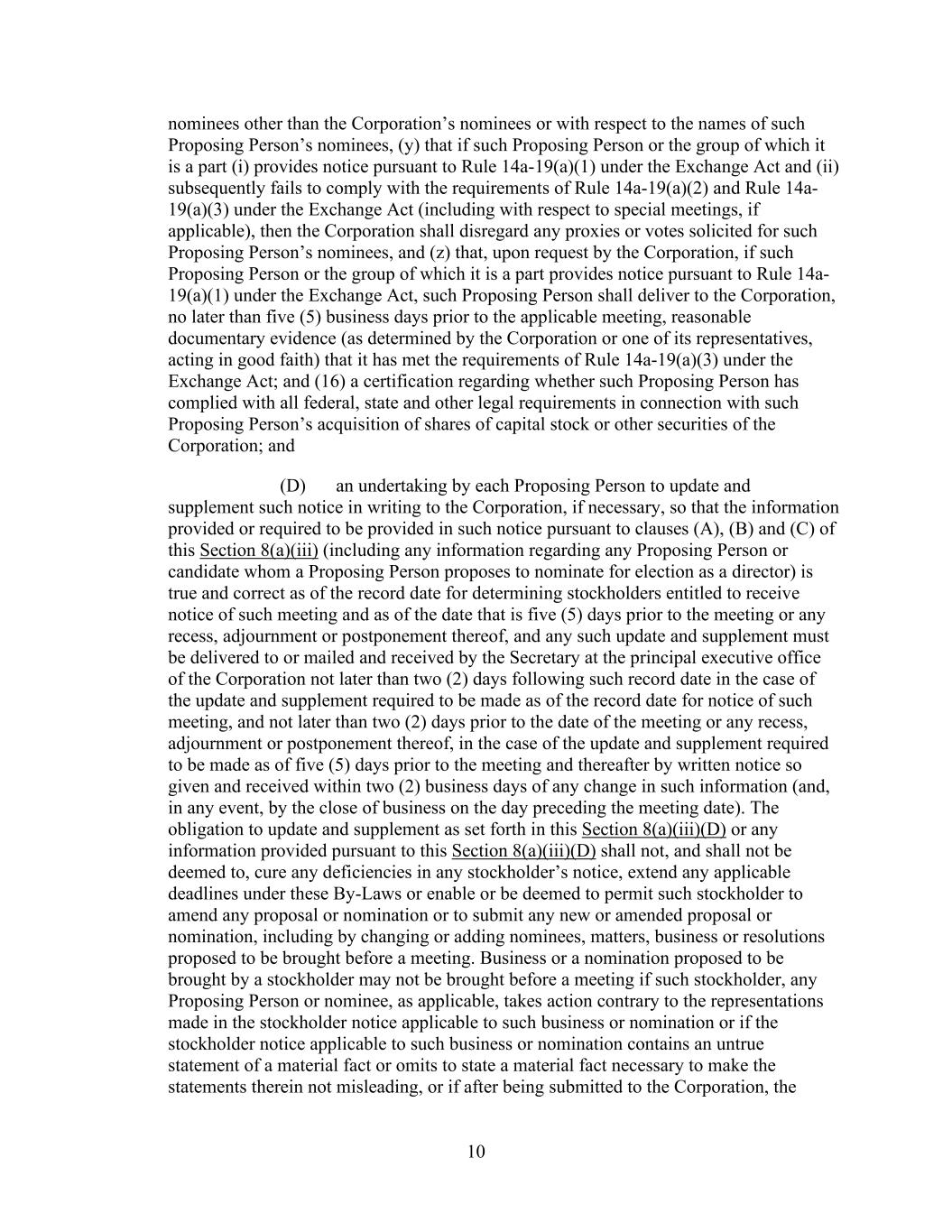
10 nominees other than the Corporation’s nominees or with respect to the names of such Proposing Person’s nominees, (y) that if such Proposing Person or the group of which it is a part (i) provides notice pursuant to Rule 14a-19(a)(1) under the Exchange Act and (ii) subsequently fails to comply with the requirements of Rule 14a-19(a)(2) and Rule 14a- 19(a)(3) under the Exchange Act (including with respect to special meetings, if applicable), then the Corporation shall disregard any proxies or votes solicited for such Proposing Person’s nominees, and (z) that, upon request by the Corporation, if such Proposing Person or the group of which it is a part provides notice pursuant to Rule 14a- 19(a)(1) under the Exchange Act, such Proposing Person shall deliver to the Corporation, no later than five (5) business days prior to the applicable meeting, reasonable documentary evidence (as determined by the Corporation or one of its representatives, acting in good faith) that it has met the requirements of Rule 14a-19(a)(3) under the Exchange Act; and (16) a certification regarding whether such Proposing Person has complied with all federal, state and other legal requirements in connection with such Proposing Person’s acquisition of shares of capital stock or other securities of the Corporation; and (D) an undertaking by each Proposing Person to update and supplement such notice in writing to the Corporation, if necessary, so that the information provided or required to be provided in such notice pursuant to clauses (A), (B) and (C) of this Section 8(a)(iii) (including any information regarding any Proposing Person or candidate whom a Proposing Person proposes to nominate for election as a director) is true and correct as of the record date for determining stockholders entitled to receive notice of such meeting and as of the date that is five (5) days prior to the meeting or any recess, adjournment or postponement thereof, and any such update and supplement must be delivered to or mailed and received by the Secretary at the principal executive office of the Corporation not later than two (2) days following such record date in the case of the update and supplement required to be made as of the record date for notice of such meeting, and not later than two (2) days prior to the date of the meeting or any recess, adjournment or postponement thereof, in the case of the update and supplement required to be made as of five (5) days prior to the meeting and thereafter by written notice so given and received within two (2) business days of any change in such information (and, in any event, by the close of business on the day preceding the meeting date). The obligation to update and supplement as set forth in this Section 8(a)(iii)(D) or any information provided pursuant to this Section 8(a)(iii)(D) shall not, and shall not be deemed to, cure any deficiencies in any stockholder’s notice, extend any applicable deadlines under these By-Laws or enable or be deemed to permit such stockholder to amend any proposal or nomination or to submit any new or amended proposal or nomination, including by changing or adding nominees, matters, business or resolutions proposed to be brought before a meeting. Business or a nomination proposed to be brought by a stockholder may not be brought before a meeting if such stockholder, any Proposing Person or nominee, as applicable, takes action contrary to the representations made in the stockholder notice applicable to such business or nomination or if the stockholder notice applicable to such business or nomination contains an untrue statement of a material fact or omits to state a material fact necessary to make the statements therein not misleading, or if after being submitted to the Corporation, the
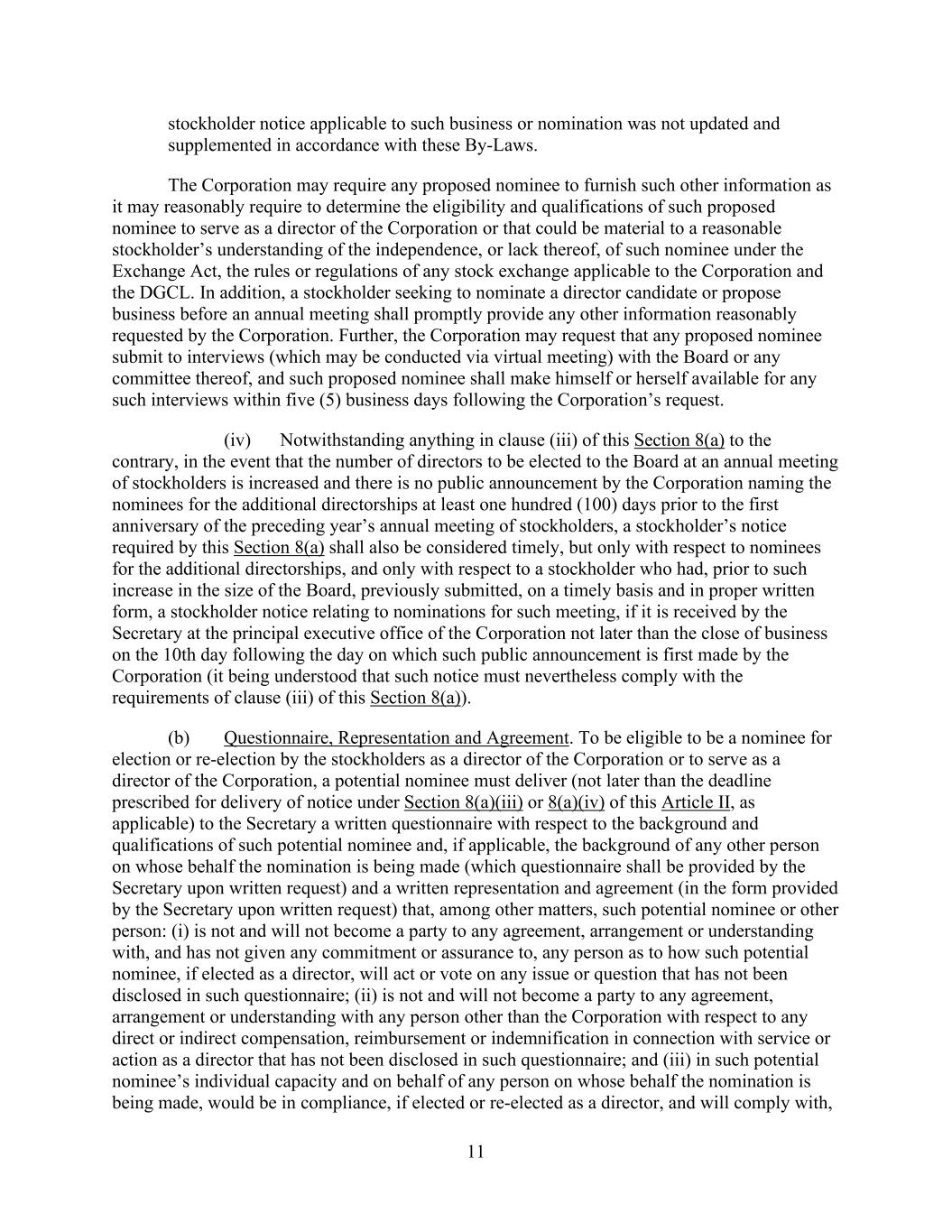
11 stockholder notice applicable to such business or nomination was not updated and supplemented in accordance with these By-Laws. The Corporation may require any proposed nominee to furnish such other information as it may reasonably require to determine the eligibility and qualifications of such proposed nominee to serve as a director of the Corporation or that could be material to a reasonable stockholder’s understanding of the independence, or lack thereof, of such nominee under the Exchange Act, the rules or regulations of any stock exchange applicable to the Corporation and the DGCL. In addition, a stockholder seeking to nominate a director candidate or propose business before an annual meeting shall promptly provide any other information reasonably requested by the Corporation. Further, the Corporation may request that any proposed nominee submit to interviews (which may be conducted via virtual meeting) with the Board or any committee thereof, and such proposed nominee shall make himself or herself available for any such interviews within five (5) business days following the Corporation’s request. (iv) Notwithstanding anything in clause (iii) of this Section 8(a) to the contrary, in the event that the number of directors to be elected to the Board at an annual meeting of stockholders is increased and there is no public announcement by the Corporation naming the nominees for the additional directorships at least one hundred (100) days prior to the first anniversary of the preceding year’s annual meeting of stockholders, a stockholder’s notice required by this Section 8(a) shall also be considered timely, but only with respect to nominees for the additional directorships, and only with respect to a stockholder who had, prior to such increase in the size of the Board, previously submitted, on a timely basis and in proper written form, a stockholder notice relating to nominations for such meeting, if it is received by the Secretary at the principal executive office of the Corporation not later than the close of business on the 10th day following the day on which such public announcement is first made by the Corporation (it being understood that such notice must nevertheless comply with the requirements of clause (iii) of this Section 8(a)). (b) Questionnaire, Representation and Agreement. To be eligible to be a nominee for election or re-election by the stockholders as a director of the Corporation or to serve as a director of the Corporation, a potential nominee must deliver (not later than the deadline prescribed for delivery of notice under Section 8(a)(iii) or 8(a)(iv) of this Article II, as applicable) to the Secretary a written questionnaire with respect to the background and qualifications of such potential nominee and, if applicable, the background of any other person on whose behalf the nomination is being made (which questionnaire shall be provided by the Secretary upon written request) and a written representation and agreement (in the form provided by the Secretary upon written request) that, among other matters, such potential nominee or other person: (i) is not and will not become a party to any agreement, arrangement or understanding with, and has not given any commitment or assurance to, any person as to how such potential nominee, if elected as a director, will act or vote on any issue or question that has not been disclosed in such questionnaire; (ii) is not and will not become a party to any agreement, arrangement or understanding with any person other than the Corporation with respect to any direct or indirect compensation, reimbursement or indemnification in connection with service or action as a director that has not been disclosed in such questionnaire; and (iii) in such potential nominee’s individual capacity and on behalf of any person on whose behalf the nomination is being made, would be in compliance, if elected or re-elected as a director, and will comply with,
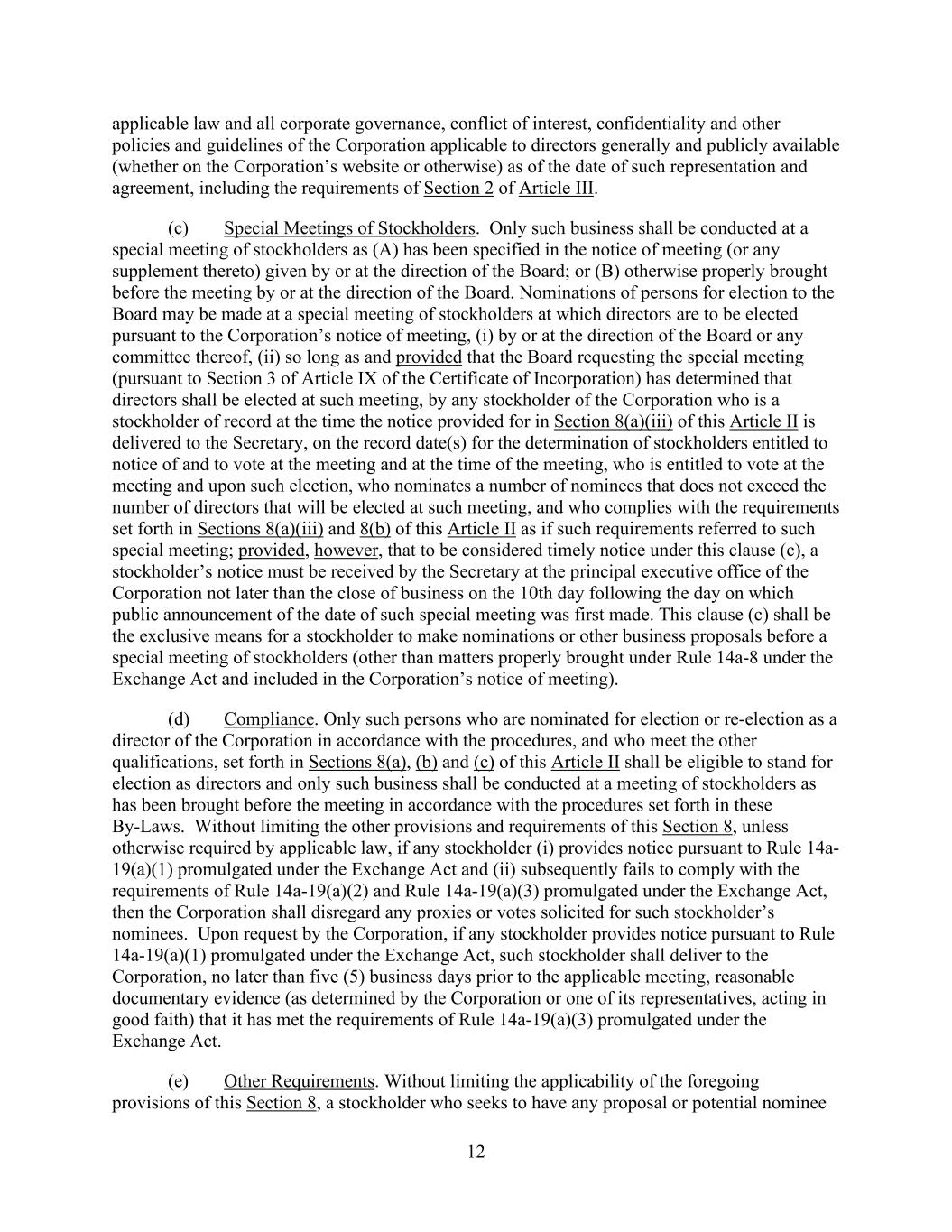
12 applicable law and all corporate governance, conflict of interest, confidentiality and other policies and guidelines of the Corporation applicable to directors generally and publicly available (whether on the Corporation’s website or otherwise) as of the date of such representation and agreement, including the requirements of Section 2 of Article III. (c) Special Meetings of Stockholders. Only such business shall be conducted at a special meeting of stockholders as (A) has been specified in the notice of meeting (or any supplement thereto) given by or at the direction of the Board; or (B) otherwise properly brought before the meeting by or at the direction of the Board. Nominations of persons for election to the Board may be made at a special meeting of stockholders at which directors are to be elected pursuant to the Corporation’s notice of meeting, (i) by or at the direction of the Board or any committee thereof, (ii) so long as and provided that the Board requesting the special meeting (pursuant to Section 3 of Article IX of the Certificate of Incorporation) has determined that directors shall be elected at such meeting, by any stockholder of the Corporation who is a stockholder of record at the time the notice provided for in Section 8(a)(iii) of this Article II is delivered to the Secretary, on the record date(s) for the determination of stockholders entitled to notice of and to vote at the meeting and at the time of the meeting, who is entitled to vote at the meeting and upon such election, who nominates a number of nominees that does not exceed the number of directors that will be elected at such meeting, and who complies with the requirements set forth in Sections 8(a)(iii) and 8(b) of this Article II as if such requirements referred to such special meeting; provided, however, that to be considered timely notice under this clause (c), a stockholder’s notice must be received by the Secretary at the principal executive office of the Corporation not later than the close of business on the 10th day following the day on which public announcement of the date of such special meeting was first made. This clause (c) shall be the exclusive means for a stockholder to make nominations or other business proposals before a special meeting of stockholders (other than matters properly brought under Rule 14a-8 under the Exchange Act and included in the Corporation’s notice of meeting). (d) Compliance. Only such persons who are nominated for election or re-election as a director of the Corporation in accordance with the procedures, and who meet the other qualifications, set forth in Sections 8(a), (b) and (c) of this Article II shall be eligible to stand for election as directors and only such business shall be conducted at a meeting of stockholders as has been brought before the meeting in accordance with the procedures set forth in these By-Laws. Without limiting the other provisions and requirements of this Section 8, unless otherwise required by applicable law, if any stockholder (i) provides notice pursuant to Rule 14a- 19(a)(1) promulgated under the Exchange Act and (ii) subsequently fails to comply with the requirements of Rule 14a-19(a)(2) and Rule 14a-19(a)(3) promulgated under the Exchange Act, then the Corporation shall disregard any proxies or votes solicited for such stockholder’s nominees. Upon request by the Corporation, if any stockholder provides notice pursuant to Rule 14a-19(a)(1) promulgated under the Exchange Act, such stockholder shall deliver to the Corporation, no later than five (5) business days prior to the applicable meeting, reasonable documentary evidence (as determined by the Corporation or one of its representatives, acting in good faith) that it has met the requirements of Rule 14a-19(a)(3) promulgated under the Exchange Act. (e) Other Requirements. Without limiting the applicability of the foregoing provisions of this Section 8, a stockholder who seeks to have any proposal or potential nominee
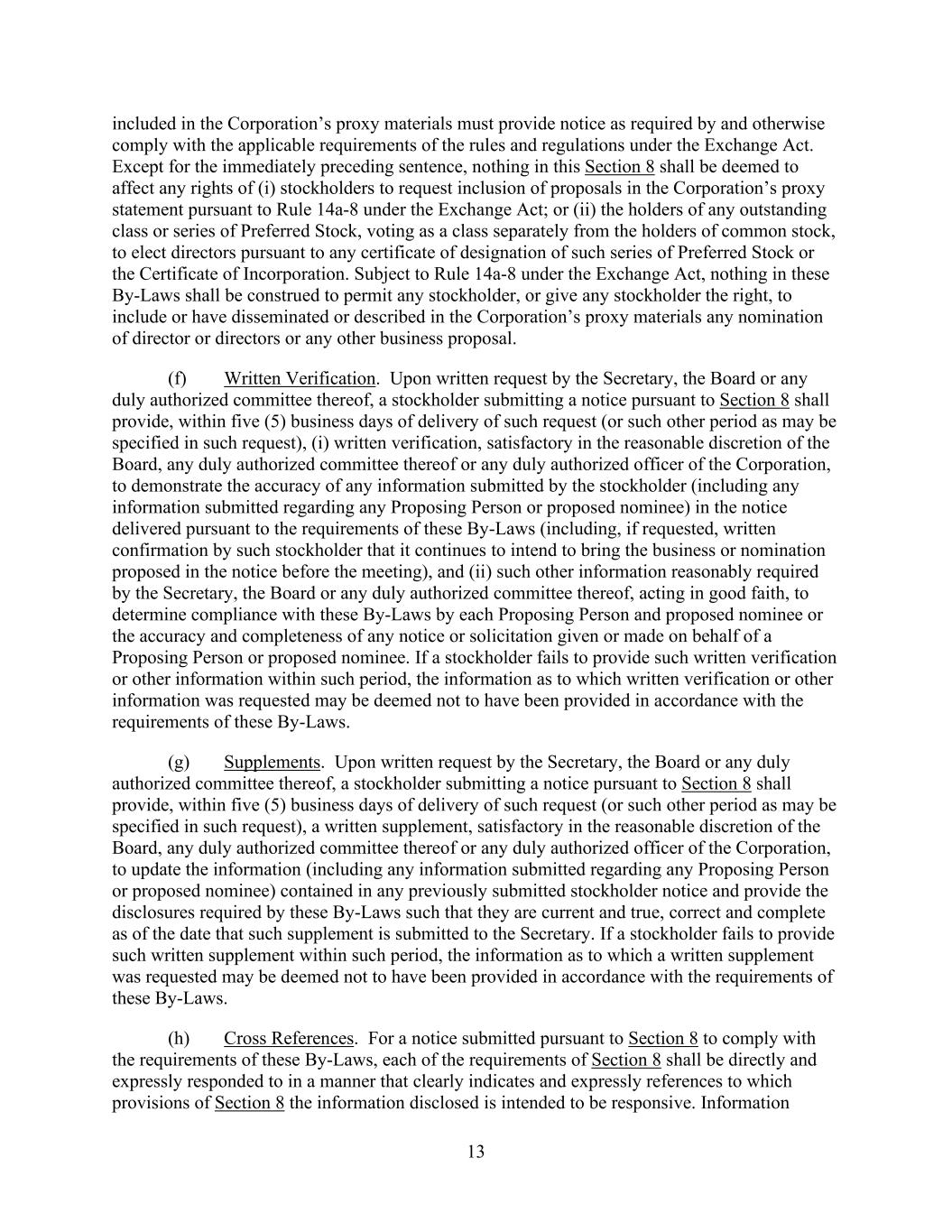
13 included in the Corporation’s proxy materials must provide notice as required by and otherwise comply with the applicable requirements of the rules and regulations under the Exchange Act. Except for the immediately preceding sentence, nothing in this Section 8 shall be deemed to affect any rights of (i) stockholders to request inclusion of proposals in the Corporation’s proxy statement pursuant to Rule 14a-8 under the Exchange Act; or (ii) the holders of any outstanding class or series of Preferred Stock, voting as a class separately from the holders of common stock, to elect directors pursuant to any certificate of designation of such series of Preferred Stock or the Certificate of Incorporation. Subject to Rule 14a-8 under the Exchange Act, nothing in these By-Laws shall be construed to permit any stockholder, or give any stockholder the right, to include or have disseminated or described in the Corporation’s proxy materials any nomination of director or directors or any other business proposal. (f) Written Verification. Upon written request by the Secretary, the Board or any duly authorized committee thereof, a stockholder submitting a notice pursuant to Section 8 shall provide, within five (5) business days of delivery of such request (or such other period as may be specified in such request), (i) written verification, satisfactory in the reasonable discretion of the Board, any duly authorized committee thereof or any duly authorized officer of the Corporation, to demonstrate the accuracy of any information submitted by the stockholder (including any information submitted regarding any Proposing Person or proposed nominee) in the notice delivered pursuant to the requirements of these By-Laws (including, if requested, written confirmation by such stockholder that it continues to intend to bring the business or nomination proposed in the notice before the meeting), and (ii) such other information reasonably required by the Secretary, the Board or any duly authorized committee thereof, acting in good faith, to determine compliance with these By-Laws by each Proposing Person and proposed nominee or the accuracy and completeness of any notice or solicitation given or made on behalf of a Proposing Person or proposed nominee. If a stockholder fails to provide such written verification or other information within such period, the information as to which written verification or other information was requested may be deemed not to have been provided in accordance with the requirements of these By-Laws. (g) Supplements. Upon written request by the Secretary, the Board or any duly authorized committee thereof, a stockholder submitting a notice pursuant to Section 8 shall provide, within five (5) business days of delivery of such request (or such other period as may be specified in such request), a written supplement, satisfactory in the reasonable discretion of the Board, any duly authorized committee thereof or any duly authorized officer of the Corporation, to update the information (including any information submitted regarding any Proposing Person or proposed nominee) contained in any previously submitted stockholder notice and provide the disclosures required by these By-Laws such that they are current and true, correct and complete as of the date that such supplement is submitted to the Secretary. If a stockholder fails to provide such written supplement within such period, the information as to which a written supplement was requested may be deemed not to have been provided in accordance with the requirements of these By-Laws. (h) Cross References. For a notice submitted pursuant to Section 8 to comply with the requirements of these By-Laws, each of the requirements of Section 8 shall be directly and expressly responded to in a manner that clearly indicates and expressly references to which provisions of Section 8 the information disclosed is intended to be responsive. Information
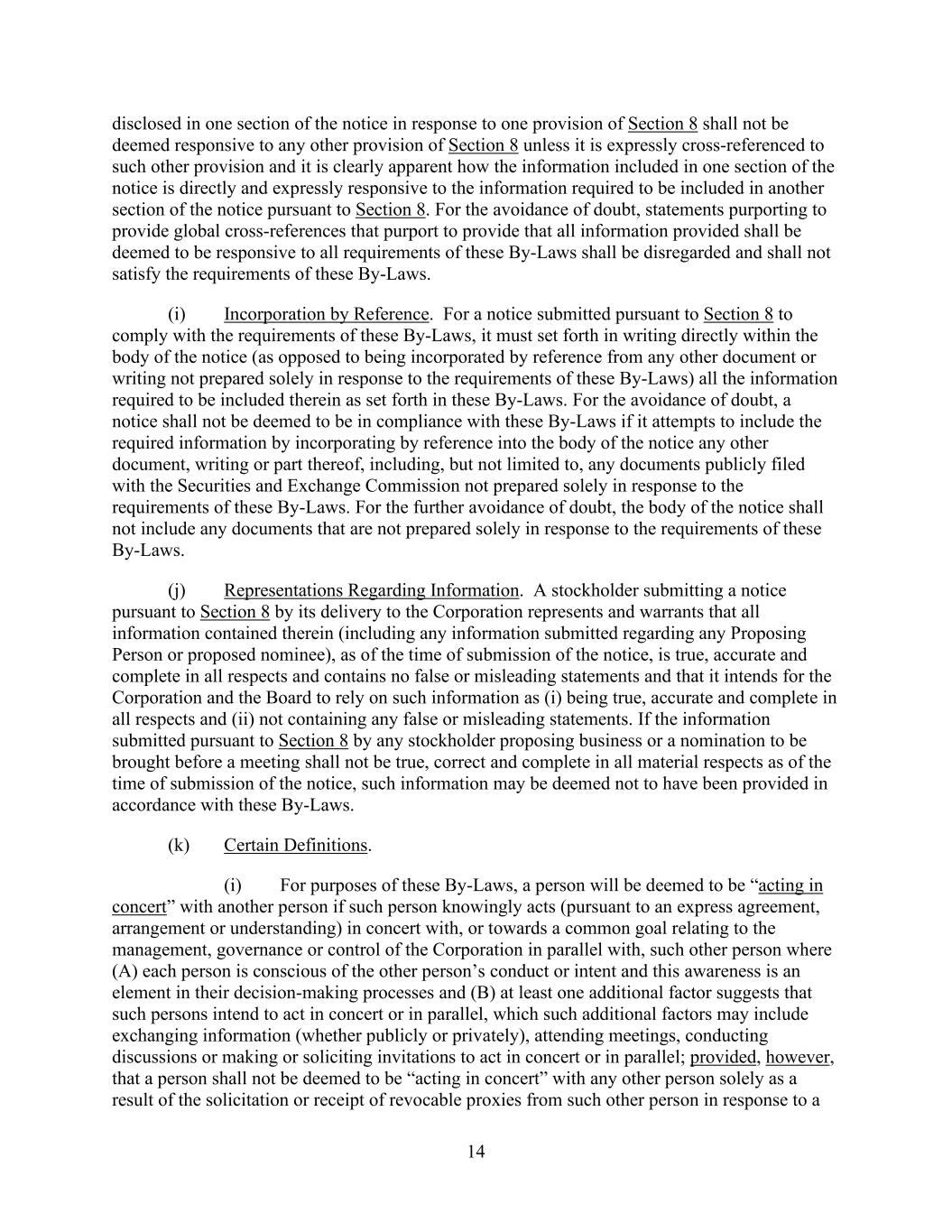
14 disclosed in one section of the notice in response to one provision of Section 8 shall not be deemed responsive to any other provision of Section 8 unless it is expressly cross-referenced to such other provision and it is clearly apparent how the information included in one section of the notice is directly and expressly responsive to the information required to be included in another section of the notice pursuant to Section 8. For the avoidance of doubt, statements purporting to provide global cross-references that purport to provide that all information provided shall be deemed to be responsive to all requirements of these By-Laws shall be disregarded and shall not satisfy the requirements of these By-Laws. (i) Incorporation by Reference. For a notice submitted pursuant to Section 8 to comply with the requirements of these By-Laws, it must set forth in writing directly within the body of the notice (as opposed to being incorporated by reference from any other document or writing not prepared solely in response to the requirements of these By-Laws) all the information required to be included therein as set forth in these By-Laws. For the avoidance of doubt, a notice shall not be deemed to be in compliance with these By-Laws if it attempts to include the required information by incorporating by reference into the body of the notice any other document, writing or part thereof, including, but not limited to, any documents publicly filed with the Securities and Exchange Commission not prepared solely in response to the requirements of these By-Laws. For the further avoidance of doubt, the body of the notice shall not include any documents that are not prepared solely in response to the requirements of these By-Laws. (j) Representations Regarding Information. A stockholder submitting a notice pursuant to Section 8 by its delivery to the Corporation represents and warrants that all information contained therein (including any information submitted regarding any Proposing Person or proposed nominee), as of the time of submission of the notice, is true, accurate and complete in all respects and contains no false or misleading statements and that it intends for the Corporation and the Board to rely on such information as (i) being true, accurate and complete in all respects and (ii) not containing any false or misleading statements. If the information submitted pursuant to Section 8 by any stockholder proposing business or a nomination to be brought before a meeting shall not be true, correct and complete in all material respects as of the time of submission of the notice, such information may be deemed not to have been provided in accordance with these By-Laws. (k) Certain Definitions. (i) For purposes of these By-Laws, a person will be deemed to be “acting in concert” with another person if such person knowingly acts (pursuant to an express agreement, arrangement or understanding) in concert with, or towards a common goal relating to the management, governance or control of the Corporation in parallel with, such other person where (A) each person is conscious of the other person’s conduct or intent and this awareness is an element in their decision-making processes and (B) at least one additional factor suggests that such persons intend to act in concert or in parallel, which such additional factors may include exchanging information (whether publicly or privately), attending meetings, conducting discussions or making or soliciting invitations to act in concert or in parallel; provided, however, that a person shall not be deemed to be “acting in concert” with any other person solely as a result of the solicitation or receipt of revocable proxies from such other person in response to a
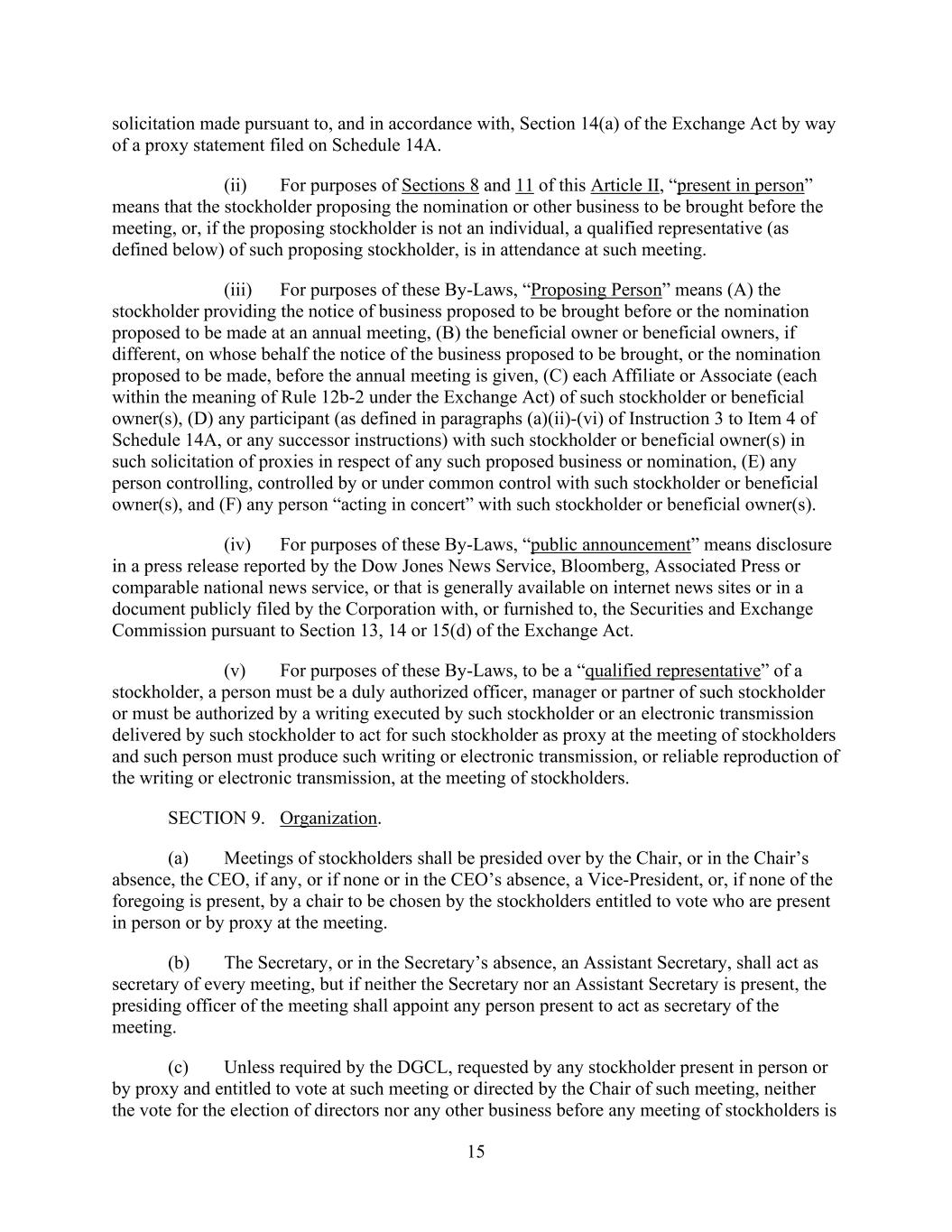
15 solicitation made pursuant to, and in accordance with, Section 14(a) of the Exchange Act by way of a proxy statement filed on Schedule 14A. (ii) For purposes of Sections 8 and 11 of this Article II, “present in person” means that the stockholder proposing the nomination or other business to be brought before the meeting, or, if the proposing stockholder is not an individual, a qualified representative (as defined below) of such proposing stockholder, is in attendance at such meeting. (iii) For purposes of these By-Laws, “Proposing Person” means (A) the stockholder providing the notice of business proposed to be brought before or the nomination proposed to be made at an annual meeting, (B) the beneficial owner or beneficial owners, if different, on whose behalf the notice of the business proposed to be brought, or the nomination proposed to be made, before the annual meeting is given, (C) each Affiliate or Associate (each within the meaning of Rule 12b-2 under the Exchange Act) of such stockholder or beneficial owner(s), (D) any participant (as defined in paragraphs (a)(ii)-(vi) of Instruction 3 to Item 4 of Schedule 14A, or any successor instructions) with such stockholder or beneficial owner(s) in such solicitation of proxies in respect of any such proposed business or nomination, (E) any person controlling, controlled by or under common control with such stockholder or beneficial owner(s), and (F) any person “acting in concert” with such stockholder or beneficial owner(s). (iv) For purposes of these By-Laws, “public announcement” means disclosure in a press release reported by the Dow Jones News Service, Bloomberg, Associated Press or comparable national news service, or that is generally available on internet news sites or in a document publicly filed by the Corporation with, or furnished to, the Securities and Exchange Commission pursuant to Section 13, 14 or 15(d) of the Exchange Act. (v) For purposes of these By-Laws, to be a “qualified representative” of a stockholder, a person must be a duly authorized officer, manager or partner of such stockholder or must be authorized by a writing executed by such stockholder or an electronic transmission delivered by such stockholder to act for such stockholder as proxy at the meeting of stockholders and such person must produce such writing or electronic transmission, or reliable reproduction of the writing or electronic transmission, at the meeting of stockholders. SECTION 9. Organization. (a) Meetings of stockholders shall be presided over by the Chair, or in the Chair’s absence, the CEO, if any, or if none or in the CEO’s absence, a Vice-President, or, if none of the foregoing is present, by a chair to be chosen by the stockholders entitled to vote who are present in person or by proxy at the meeting. (b) The Secretary, or in the Secretary’s absence, an Assistant Secretary, shall act as secretary of every meeting, but if neither the Secretary nor an Assistant Secretary is present, the presiding officer of the meeting shall appoint any person present to act as secretary of the meeting. (c) Unless required by the DGCL, requested by any stockholder present in person or by proxy and entitled to vote at such meeting or directed by the Chair of such meeting, neither the vote for the election of directors nor any other business before any meeting of stockholders is
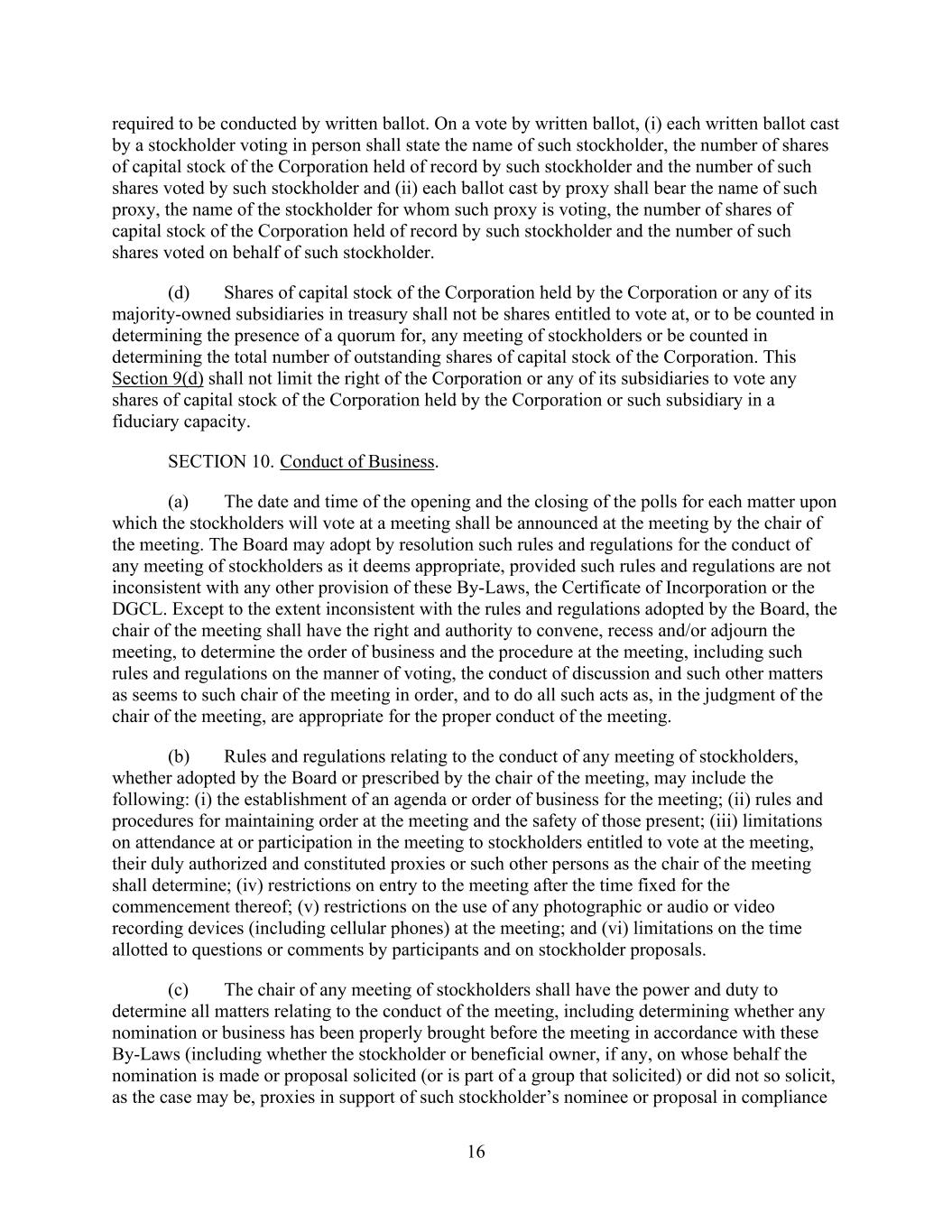
16 required to be conducted by written ballot. On a vote by written ballot, (i) each written ballot cast by a stockholder voting in person shall state the name of such stockholder, the number of shares of capital stock of the Corporation held of record by such stockholder and the number of such shares voted by such stockholder and (ii) each ballot cast by proxy shall bear the name of such proxy, the name of the stockholder for whom such proxy is voting, the number of shares of capital stock of the Corporation held of record by such stockholder and the number of such shares voted on behalf of such stockholder. (d) Shares of capital stock of the Corporation held by the Corporation or any of its majority-owned subsidiaries in treasury shall not be shares entitled to vote at, or to be counted in determining the presence of a quorum for, any meeting of stockholders or be counted in determining the total number of outstanding shares of capital stock of the Corporation. This Section 9(d) shall not limit the right of the Corporation or any of its subsidiaries to vote any shares of capital stock of the Corporation held by the Corporation or such subsidiary in a fiduciary capacity. SECTION 10. Conduct of Business. (a) The date and time of the opening and the closing of the polls for each matter upon which the stockholders will vote at a meeting shall be announced at the meeting by the chair of the meeting. The Board may adopt by resolution such rules and regulations for the conduct of any meeting of stockholders as it deems appropriate, provided such rules and regulations are not inconsistent with any other provision of these By-Laws, the Certificate of Incorporation or the DGCL. Except to the extent inconsistent with the rules and regulations adopted by the Board, the chair of the meeting shall have the right and authority to convene, recess and/or adjourn the meeting, to determine the order of business and the procedure at the meeting, including such rules and regulations on the manner of voting, the conduct of discussion and such other matters as seems to such chair of the meeting in order, and to do all such acts as, in the judgment of the chair of the meeting, are appropriate for the proper conduct of the meeting. (b) Rules and regulations relating to the conduct of any meeting of stockholders, whether adopted by the Board or prescribed by the chair of the meeting, may include the following: (i) the establishment of an agenda or order of business for the meeting; (ii) rules and procedures for maintaining order at the meeting and the safety of those present; (iii) limitations on attendance at or participation in the meeting to stockholders entitled to vote at the meeting, their duly authorized and constituted proxies or such other persons as the chair of the meeting shall determine; (iv) restrictions on entry to the meeting after the time fixed for the commencement thereof; (v) restrictions on the use of any photographic or audio or video recording devices (including cellular phones) at the meeting; and (vi) limitations on the time allotted to questions or comments by participants and on stockholder proposals. (c) The chair of any meeting of stockholders shall have the power and duty to determine all matters relating to the conduct of the meeting, including determining whether any nomination or business has been properly brought before the meeting in accordance with these By-Laws (including whether the stockholder or beneficial owner, if any, on whose behalf the nomination is made or proposal solicited (or is part of a group that solicited) or did not so solicit, as the case may be, proxies in support of such stockholder’s nominee or proposal in compliance
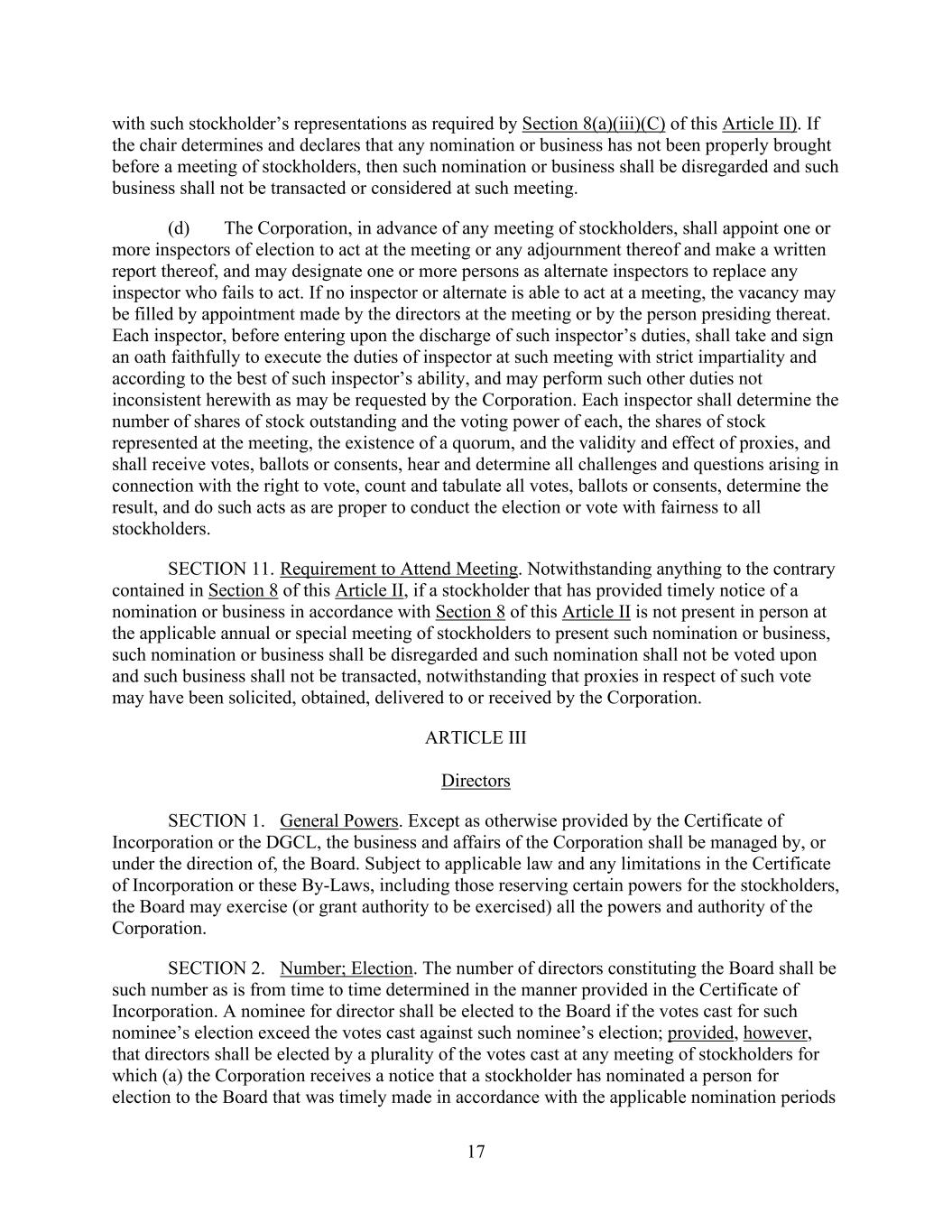
17 with such stockholder’s representations as required by Section 8(a)(iii)(C) of this Article II). If the chair determines and declares that any nomination or business has not been properly brought before a meeting of stockholders, then such nomination or business shall be disregarded and such business shall not be transacted or considered at such meeting. (d) The Corporation, in advance of any meeting of stockholders, shall appoint one or more inspectors of election to act at the meeting or any adjournment thereof and make a written report thereof, and may designate one or more persons as alternate inspectors to replace any inspector who fails to act. If no inspector or alternate is able to act at a meeting, the vacancy may be filled by appointment made by the directors at the meeting or by the person presiding thereat. Each inspector, before entering upon the discharge of such inspector’s duties, shall take and sign an oath faithfully to execute the duties of inspector at such meeting with strict impartiality and according to the best of such inspector’s ability, and may perform such other duties not inconsistent herewith as may be requested by the Corporation. Each inspector shall determine the number of shares of stock outstanding and the voting power of each, the shares of stock represented at the meeting, the existence of a quorum, and the validity and effect of proxies, and shall receive votes, ballots or consents, hear and determine all challenges and questions arising in connection with the right to vote, count and tabulate all votes, ballots or consents, determine the result, and do such acts as are proper to conduct the election or vote with fairness to all stockholders. SECTION 11. Requirement to Attend Meeting. Notwithstanding anything to the contrary contained in Section 8 of this Article II, if a stockholder that has provided timely notice of a nomination or business in accordance with Section 8 of this Article II is not present in person at the applicable annual or special meeting of stockholders to present such nomination or business, such nomination or business shall be disregarded and such nomination shall not be voted upon and such business shall not be transacted, notwithstanding that proxies in respect of such vote may have been solicited, obtained, delivered to or received by the Corporation. ARTICLE III Directors SECTION 1. General Powers. Except as otherwise provided by the Certificate of Incorporation or the DGCL, the business and affairs of the Corporation shall be managed by, or under the direction of, the Board. Subject to applicable law and any limitations in the Certificate of Incorporation or these By-Laws, including those reserving certain powers for the stockholders, the Board may exercise (or grant authority to be exercised) all the powers and authority of the Corporation. SECTION 2. Number; Election. The number of directors constituting the Board shall be such number as is from time to time determined in the manner provided in the Certificate of Incorporation. A nominee for director shall be elected to the Board if the votes cast for such nominee’s election exceed the votes cast against such nominee’s election; provided, however, that directors shall be elected by a plurality of the votes cast at any meeting of stockholders for which (a) the Corporation receives a notice that a stockholder has nominated a person for election to the Board that was timely made in accordance with the applicable nomination periods
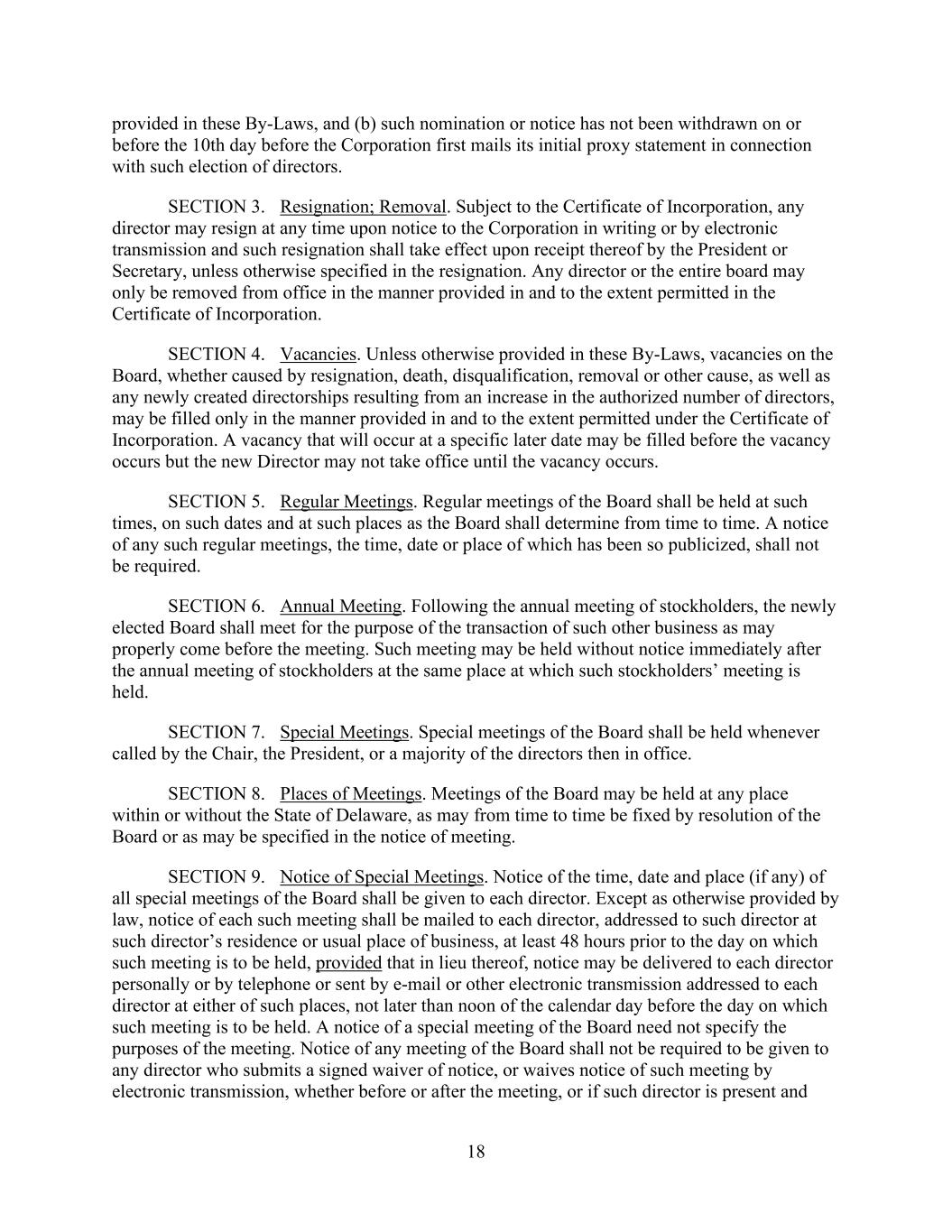
18 provided in these By-Laws, and (b) such nomination or notice has not been withdrawn on or before the 10th day before the Corporation first mails its initial proxy statement in connection with such election of directors. SECTION 3. Resignation; Removal. Subject to the Certificate of Incorporation, any director may resign at any time upon notice to the Corporation in writing or by electronic transmission and such resignation shall take effect upon receipt thereof by the President or Secretary, unless otherwise specified in the resignation. Any director or the entire board may only be removed from office in the manner provided in and to the extent permitted in the Certificate of Incorporation. SECTION 4. Vacancies. Unless otherwise provided in these By-Laws, vacancies on the Board, whether caused by resignation, death, disqualification, removal or other cause, as well as any newly created directorships resulting from an increase in the authorized number of directors, may be filled only in the manner provided in and to the extent permitted under the Certificate of Incorporation. A vacancy that will occur at a specific later date may be filled before the vacancy occurs but the new Director may not take office until the vacancy occurs. SECTION 5. Regular Meetings. Regular meetings of the Board shall be held at such times, on such dates and at such places as the Board shall determine from time to time. A notice of any such regular meetings, the time, date or place of which has been so publicized, shall not be required. SECTION 6. Annual Meeting. Following the annual meeting of stockholders, the newly elected Board shall meet for the purpose of the transaction of such other business as may properly come before the meeting. Such meeting may be held without notice immediately after the annual meeting of stockholders at the same place at which such stockholders’ meeting is held. SECTION 7. Special Meetings. Special meetings of the Board shall be held whenever called by the Chair, the President, or a majority of the directors then in office. SECTION 8. Places of Meetings. Meetings of the Board may be held at any place within or without the State of Delaware, as may from time to time be fixed by resolution of the Board or as may be specified in the notice of meeting. SECTION 9. Notice of Special Meetings. Notice of the time, date and place (if any) of all special meetings of the Board shall be given to each director. Except as otherwise provided by law, notice of each such meeting shall be mailed to each director, addressed to such director at such director’s residence or usual place of business, at least 48 hours prior to the day on which such meeting is to be held, provided that in lieu thereof, notice may be delivered to each director personally or by telephone or sent by e-mail or other electronic transmission addressed to each director at either of such places, not later than noon of the calendar day before the day on which such meeting is to be held. A notice of a special meeting of the Board need not specify the purposes of the meeting. Notice of any meeting of the Board shall not be required to be given to any director who submits a signed waiver of notice, or waives notice of such meeting by electronic transmission, whether before or after the meeting, or if such director is present and
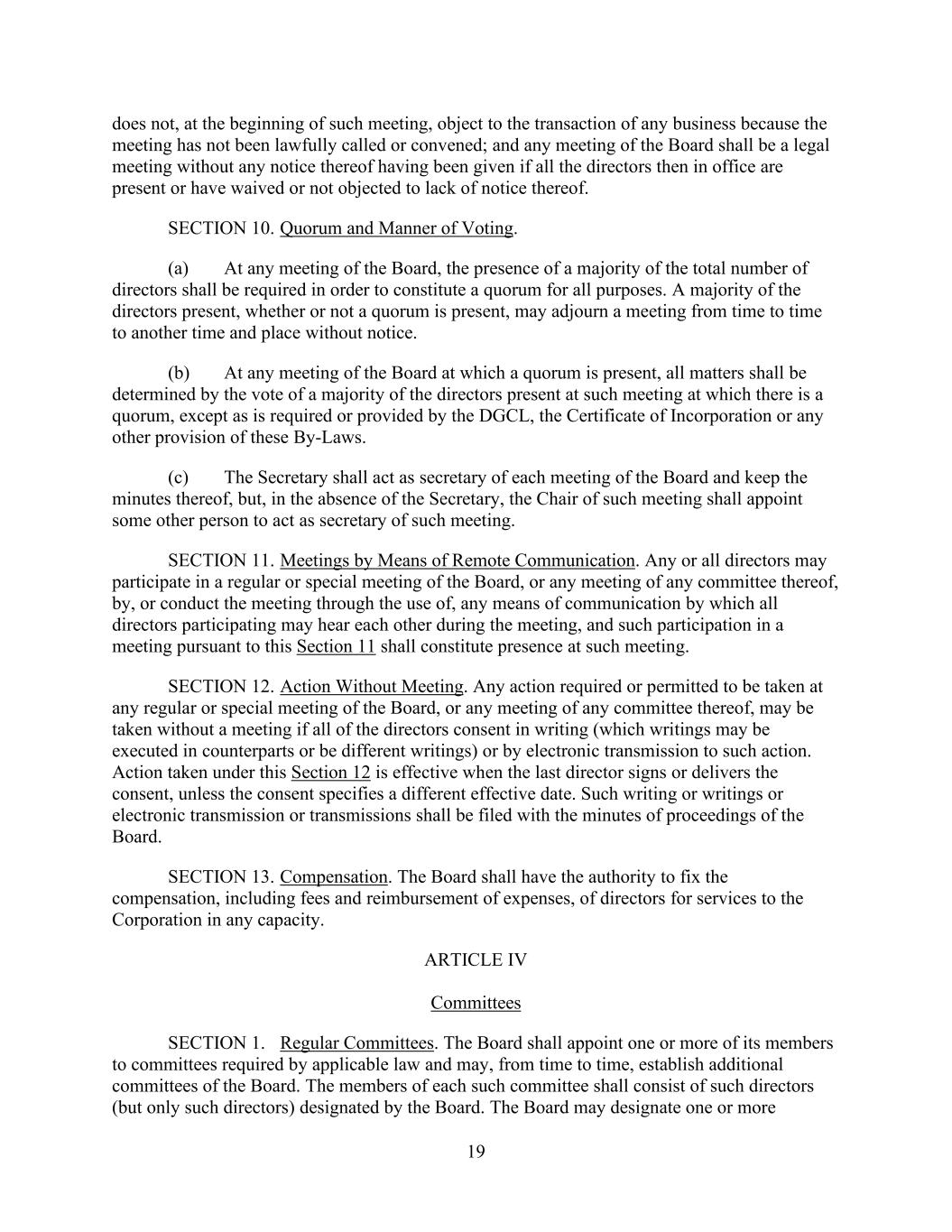
19 does not, at the beginning of such meeting, object to the transaction of any business because the meeting has not been lawfully called or convened; and any meeting of the Board shall be a legal meeting without any notice thereof having been given if all the directors then in office are present or have waived or not objected to lack of notice thereof. SECTION 10. Quorum and Manner of Voting. (a) At any meeting of the Board, the presence of a majority of the total number of directors shall be required in order to constitute a quorum for all purposes. A majority of the directors present, whether or not a quorum is present, may adjourn a meeting from time to time to another time and place without notice. (b) At any meeting of the Board at which a quorum is present, all matters shall be determined by the vote of a majority of the directors present at such meeting at which there is a quorum, except as is required or provided by the DGCL, the Certificate of Incorporation or any other provision of these By-Laws. (c) The Secretary shall act as secretary of each meeting of the Board and keep the minutes thereof, but, in the absence of the Secretary, the Chair of such meeting shall appoint some other person to act as secretary of such meeting. SECTION 11. Meetings by Means of Remote Communication. Any or all directors may participate in a regular or special meeting of the Board, or any meeting of any committee thereof, by, or conduct the meeting through the use of, any means of communication by which all directors participating may hear each other during the meeting, and such participation in a meeting pursuant to this Section 11 shall constitute presence at such meeting. SECTION 12. Action Without Meeting. Any action required or permitted to be taken at any regular or special meeting of the Board, or any meeting of any committee thereof, may be taken without a meeting if all of the directors consent in writing (which writings may be executed in counterparts or be different writings) or by electronic transmission to such action. Action taken under this Section 12 is effective when the last director signs or delivers the consent, unless the consent specifies a different effective date. Such writing or writings or electronic transmission or transmissions shall be filed with the minutes of proceedings of the Board. SECTION 13. Compensation. The Board shall have the authority to fix the compensation, including fees and reimbursement of expenses, of directors for services to the Corporation in any capacity. ARTICLE IV Committees SECTION 1. Regular Committees. The Board shall appoint one or more of its members to committees required by applicable law and may, from time to time, establish additional committees of the Board. The members of each such committee shall consist of such directors (but only such directors) designated by the Board. The Board may designate one or more
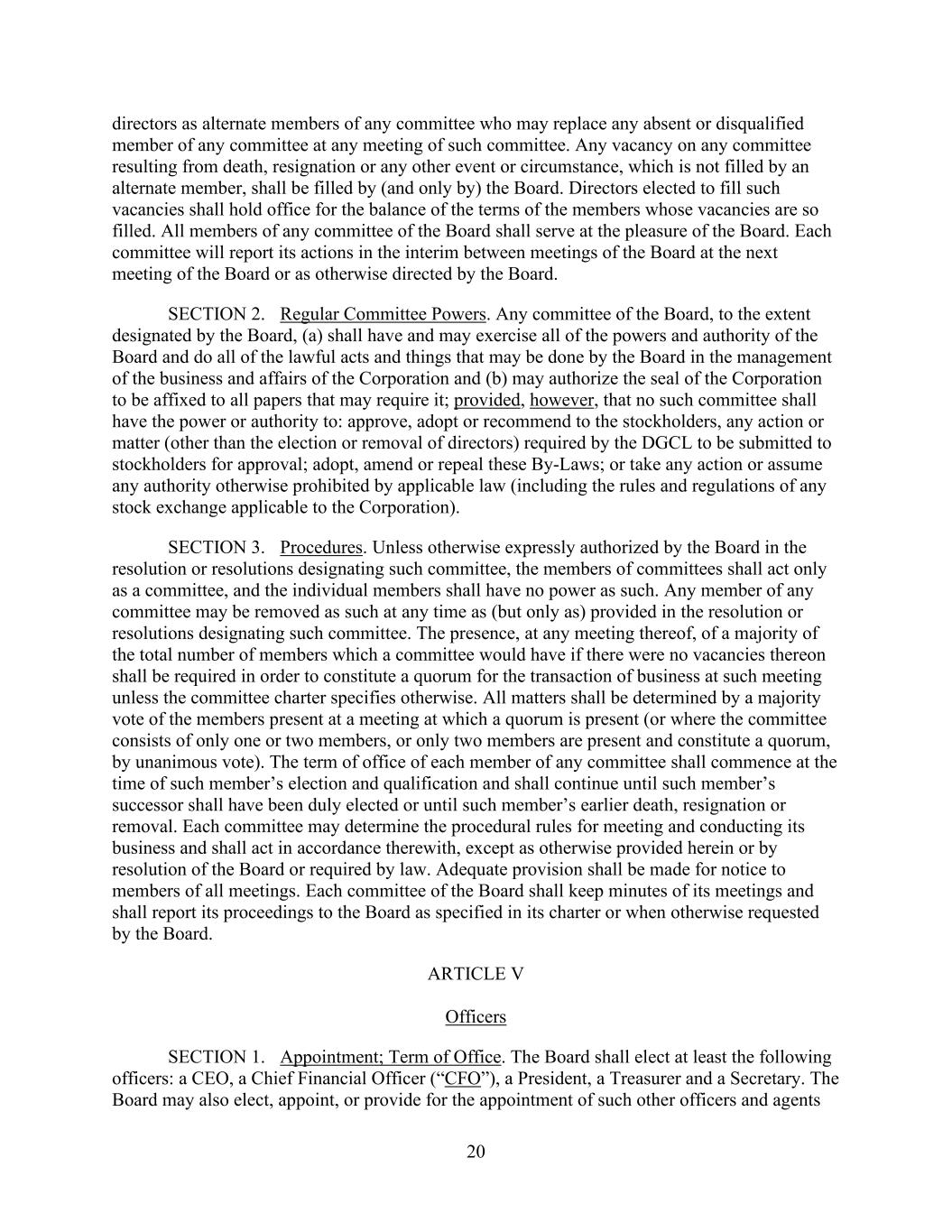
20 directors as alternate members of any committee who may replace any absent or disqualified member of any committee at any meeting of such committee. Any vacancy on any committee resulting from death, resignation or any other event or circumstance, which is not filled by an alternate member, shall be filled by (and only by) the Board. Directors elected to fill such vacancies shall hold office for the balance of the terms of the members whose vacancies are so filled. All members of any committee of the Board shall serve at the pleasure of the Board. Each committee will report its actions in the interim between meetings of the Board at the next meeting of the Board or as otherwise directed by the Board. SECTION 2. Regular Committee Powers. Any committee of the Board, to the extent designated by the Board, (a) shall have and may exercise all of the powers and authority of the Board and do all of the lawful acts and things that may be done by the Board in the management of the business and affairs of the Corporation and (b) may authorize the seal of the Corporation to be affixed to all papers that may require it; provided, however, that no such committee shall have the power or authority to: approve, adopt or recommend to the stockholders, any action or matter (other than the election or removal of directors) required by the DGCL to be submitted to stockholders for approval; adopt, amend or repeal these By-Laws; or take any action or assume any authority otherwise prohibited by applicable law (including the rules and regulations of any stock exchange applicable to the Corporation). SECTION 3. Procedures. Unless otherwise expressly authorized by the Board in the resolution or resolutions designating such committee, the members of committees shall act only as a committee, and the individual members shall have no power as such. Any member of any committee may be removed as such at any time as (but only as) provided in the resolution or resolutions designating such committee. The presence, at any meeting thereof, of a majority of the total number of members which a committee would have if there were no vacancies thereon shall be required in order to constitute a quorum for the transaction of business at such meeting unless the committee charter specifies otherwise. All matters shall be determined by a majority vote of the members present at a meeting at which a quorum is present (or where the committee consists of only one or two members, or only two members are present and constitute a quorum, by unanimous vote). The term of office of each member of any committee shall commence at the time of such member’s election and qualification and shall continue until such member’s successor shall have been duly elected or until such member’s earlier death, resignation or removal. Each committee may determine the procedural rules for meeting and conducting its business and shall act in accordance therewith, except as otherwise provided herein or by resolution of the Board or required by law. Adequate provision shall be made for notice to members of all meetings. Each committee of the Board shall keep minutes of its meetings and shall report its proceedings to the Board as specified in its charter or when otherwise requested by the Board. ARTICLE V Officers SECTION 1. Appointment; Term of Office. The Board shall elect at least the following officers: a CEO, a Chief Financial Officer (“CFO”), a President, a Treasurer and a Secretary. The Board may also elect, appoint, or provide for the appointment of such other officers and agents
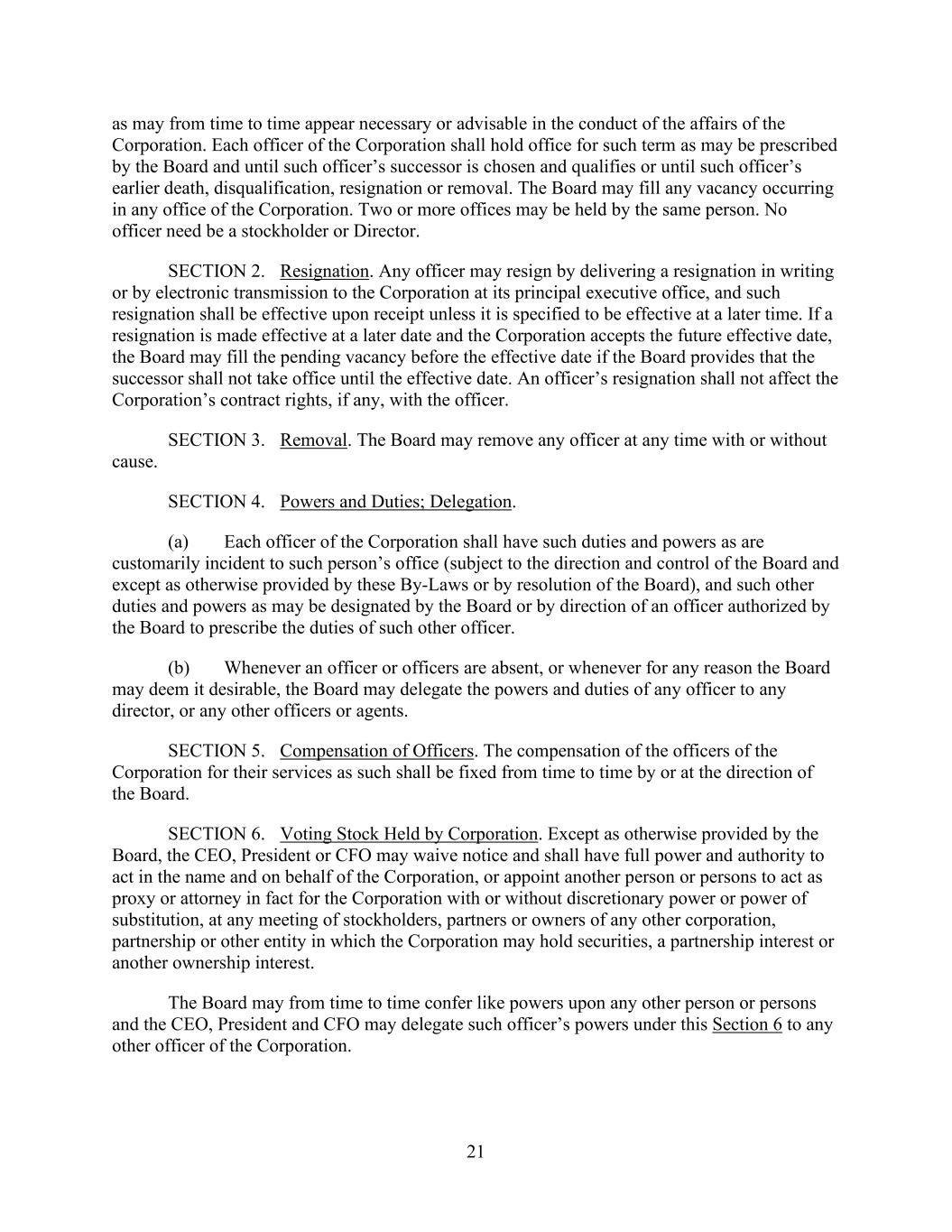
21 as may from time to time appear necessary or advisable in the conduct of the affairs of the Corporation. Each officer of the Corporation shall hold office for such term as may be prescribed by the Board and until such officer’s successor is chosen and qualifies or until such officer’s earlier death, disqualification, resignation or removal. The Board may fill any vacancy occurring in any office of the Corporation. Two or more offices may be held by the same person. No officer need be a stockholder or Director. SECTION 2. Resignation. Any officer may resign by delivering a resignation in writing or by electronic transmission to the Corporation at its principal executive office, and such resignation shall be effective upon receipt unless it is specified to be effective at a later time. If a resignation is made effective at a later date and the Corporation accepts the future effective date, the Board may fill the pending vacancy before the effective date if the Board provides that the successor shall not take office until the effective date. An officer’s resignation shall not affect the Corporation’s contract rights, if any, with the officer. SECTION 3. Removal. The Board may remove any officer at any time with or without cause. SECTION 4. Powers and Duties; Delegation. (a) Each officer of the Corporation shall have such duties and powers as are customarily incident to such person’s office (subject to the direction and control of the Board and except as otherwise provided by these By-Laws or by resolution of the Board), and such other duties and powers as may be designated by the Board or by direction of an officer authorized by the Board to prescribe the duties of such other officer. (b) Whenever an officer or officers are absent, or whenever for any reason the Board may deem it desirable, the Board may delegate the powers and duties of any officer to any director, or any other officers or agents. SECTION 5. Compensation of Officers. The compensation of the officers of the Corporation for their services as such shall be fixed from time to time by or at the direction of the Board. SECTION 6. Voting Stock Held by Corporation. Except as otherwise provided by the Board, the CEO, President or CFO may waive notice and shall have full power and authority to act in the name and on behalf of the Corporation, or appoint another person or persons to act as proxy or attorney in fact for the Corporation with or without discretionary power or power of substitution, at any meeting of stockholders, partners or owners of any other corporation, partnership or other entity in which the Corporation may hold securities, a partnership interest or another ownership interest. The Board may from time to time confer like powers upon any other person or persons and the CEO, President and CFO may delegate such officer’s powers under this Section 6 to any other officer of the Corporation.
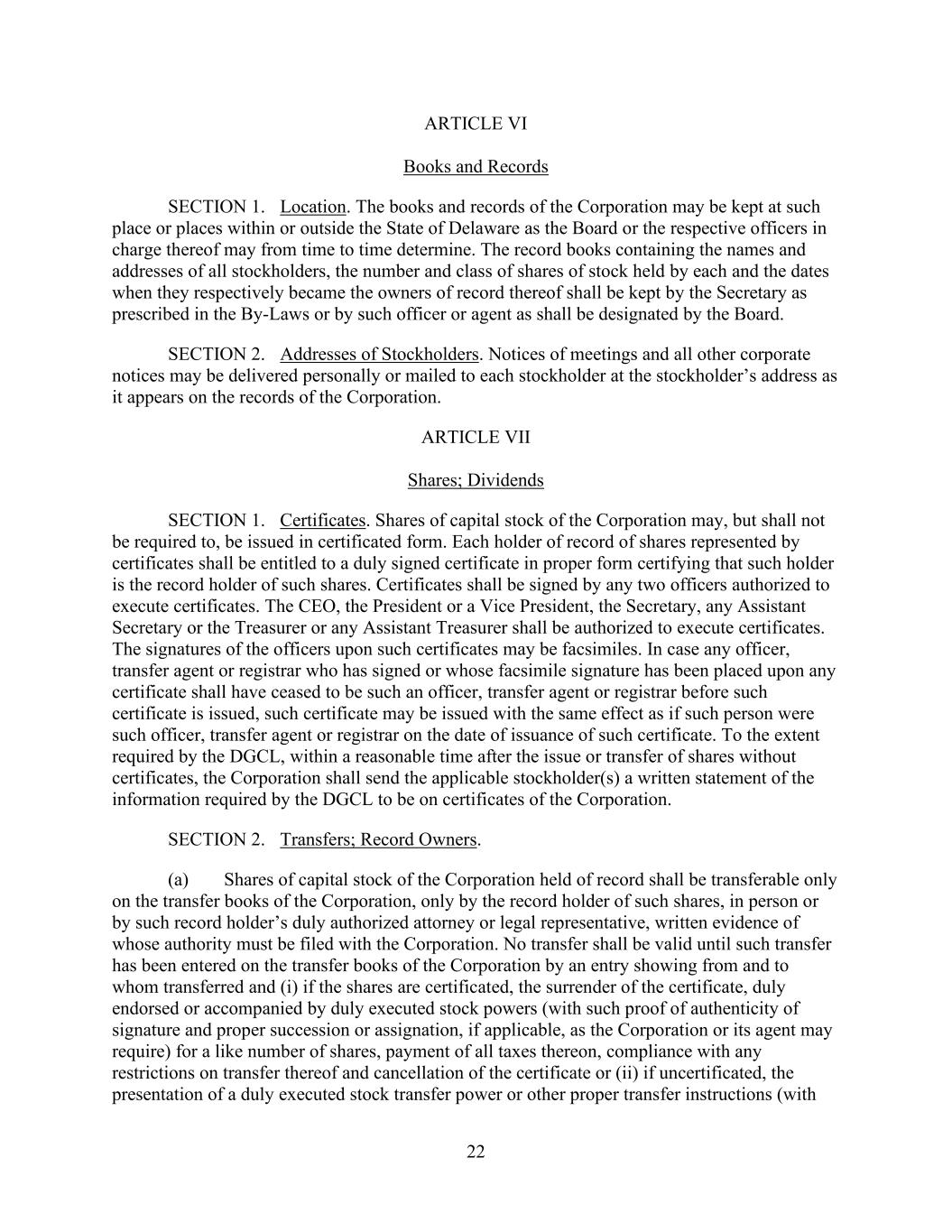
22 ARTICLE VI Books and Records SECTION 1. Location. The books and records of the Corporation may be kept at such place or places within or outside the State of Delaware as the Board or the respective officers in charge thereof may from time to time determine. The record books containing the names and addresses of all stockholders, the number and class of shares of stock held by each and the dates when they respectively became the owners of record thereof shall be kept by the Secretary as prescribed in the By-Laws or by such officer or agent as shall be designated by the Board. SECTION 2. Addresses of Stockholders. Notices of meetings and all other corporate notices may be delivered personally or mailed to each stockholder at the stockholder’s address as it appears on the records of the Corporation. ARTICLE VII Shares; Dividends SECTION 1. Certificates. Shares of capital stock of the Corporation may, but shall not be required to, be issued in certificated form. Each holder of record of shares represented by certificates shall be entitled to a duly signed certificate in proper form certifying that such holder is the record holder of such shares. Certificates shall be signed by any two officers authorized to execute certificates. The CEO, the President or a Vice President, the Secretary, any Assistant Secretary or the Treasurer or any Assistant Treasurer shall be authorized to execute certificates. The signatures of the officers upon such certificates may be facsimiles. In case any officer, transfer agent or registrar who has signed or whose facsimile signature has been placed upon any certificate shall have ceased to be such an officer, transfer agent or registrar before such certificate is issued, such certificate may be issued with the same effect as if such person were such officer, transfer agent or registrar on the date of issuance of such certificate. To the extent required by the DGCL, within a reasonable time after the issue or transfer of shares without certificates, the Corporation shall send the applicable stockholder(s) a written statement of the information required by the DGCL to be on certificates of the Corporation. SECTION 2. Transfers; Record Owners. (a) Shares of capital stock of the Corporation held of record shall be transferable only on the transfer books of the Corporation, only by the record holder of such shares, in person or by such record holder’s duly authorized attorney or legal representative, written evidence of whose authority must be filed with the Corporation. No transfer shall be valid until such transfer has been entered on the transfer books of the Corporation by an entry showing from and to whom transferred and (i) if the shares are certificated, the surrender of the certificate, duly endorsed or accompanied by duly executed stock powers (with such proof of authenticity of signature and proper succession or assignation, if applicable, as the Corporation or its agent may require) for a like number of shares, payment of all taxes thereon, compliance with any restrictions on transfer thereof and cancellation of the certificate or (ii) if uncertificated, the presentation of a duly executed stock transfer power or other proper transfer instructions (with
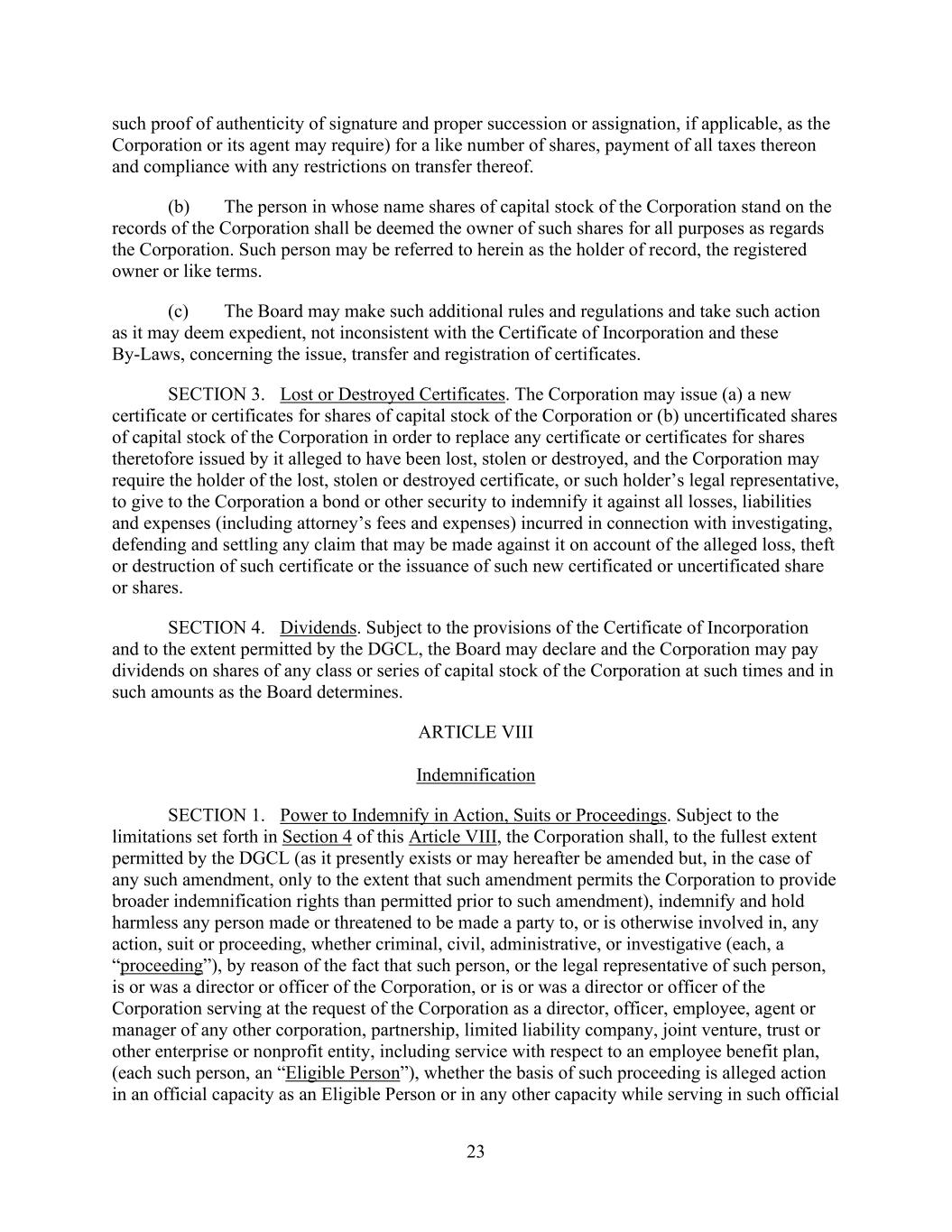
23 such proof of authenticity of signature and proper succession or assignation, if applicable, as the Corporation or its agent may require) for a like number of shares, payment of all taxes thereon and compliance with any restrictions on transfer thereof. (b) The person in whose name shares of capital stock of the Corporation stand on the records of the Corporation shall be deemed the owner of such shares for all purposes as regards the Corporation. Such person may be referred to herein as the holder of record, the registered owner or like terms. (c) The Board may make such additional rules and regulations and take such action as it may deem expedient, not inconsistent with the Certificate of Incorporation and these By-Laws, concerning the issue, transfer and registration of certificates. SECTION 3. Lost or Destroyed Certificates. The Corporation may issue (a) a new certificate or certificates for shares of capital stock of the Corporation or (b) uncertificated shares of capital stock of the Corporation in order to replace any certificate or certificates for shares theretofore issued by it alleged to have been lost, stolen or destroyed, and the Corporation may require the holder of the lost, stolen or destroyed certificate, or such holder’s legal representative, to give to the Corporation a bond or other security to indemnify it against all losses, liabilities and expenses (including attorney’s fees and expenses) incurred in connection with investigating, defending and settling any claim that may be made against it on account of the alleged loss, theft or destruction of such certificate or the issuance of such new certificated or uncertificated share or shares. SECTION 4. Dividends. Subject to the provisions of the Certificate of Incorporation and to the extent permitted by the DGCL, the Board may declare and the Corporation may pay dividends on shares of any class or series of capital stock of the Corporation at such times and in such amounts as the Board determines. ARTICLE VIII Indemnification SECTION 1. Power to Indemnify in Action, Suits or Proceedings. Subject to the limitations set forth in Section 4 of this Article VIII, the Corporation shall, to the fullest extent permitted by the DGCL (as it presently exists or may hereafter be amended but, in the case of any such amendment, only to the extent that such amendment permits the Corporation to provide broader indemnification rights than permitted prior to such amendment), indemnify and hold harmless any person made or threatened to be made a party to, or is otherwise involved in, any action, suit or proceeding, whether criminal, civil, administrative, or investigative (each, a “proceeding”), by reason of the fact that such person, or the legal representative of such person, is or was a director or officer of the Corporation, or is or was a director or officer of the Corporation serving at the request of the Corporation as a director, officer, employee, agent or manager of any other corporation, partnership, limited liability company, joint venture, trust or other enterprise or nonprofit entity, including service with respect to an employee benefit plan, (each such person, an “Eligible Person”), whether the basis of such proceeding is alleged action in an official capacity as an Eligible Person or in any other capacity while serving in such official
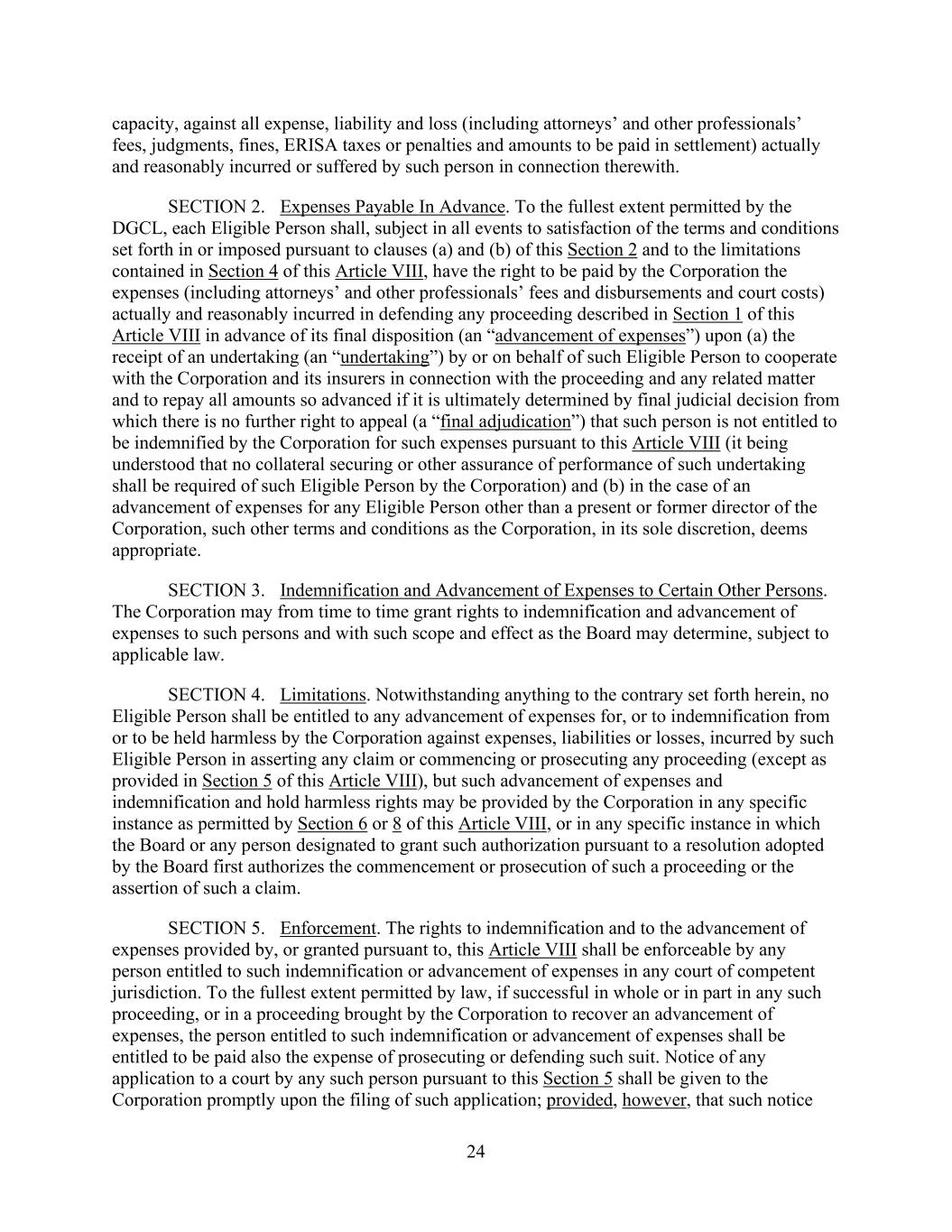
24 capacity, against all expense, liability and loss (including attorneys’ and other professionals’ fees, judgments, fines, ERISA taxes or penalties and amounts to be paid in settlement) actually and reasonably incurred or suffered by such person in connection therewith. SECTION 2. Expenses Payable In Advance. To the fullest extent permitted by the DGCL, each Eligible Person shall, subject in all events to satisfaction of the terms and conditions set forth in or imposed pursuant to clauses (a) and (b) of this Section 2 and to the limitations contained in Section 4 of this Article VIII, have the right to be paid by the Corporation the expenses (including attorneys’ and other professionals’ fees and disbursements and court costs) actually and reasonably incurred in defending any proceeding described in Section 1 of this Article VIII in advance of its final disposition (an “advancement of expenses”) upon (a) the receipt of an undertaking (an “undertaking”) by or on behalf of such Eligible Person to cooperate with the Corporation and its insurers in connection with the proceeding and any related matter and to repay all amounts so advanced if it is ultimately determined by final judicial decision from which there is no further right to appeal (a “final adjudication”) that such person is not entitled to be indemnified by the Corporation for such expenses pursuant to this Article VIII (it being understood that no collateral securing or other assurance of performance of such undertaking shall be required of such Eligible Person by the Corporation) and (b) in the case of an advancement of expenses for any Eligible Person other than a present or former director of the Corporation, such other terms and conditions as the Corporation, in its sole discretion, deems appropriate. SECTION 3. Indemnification and Advancement of Expenses to Certain Other Persons. The Corporation may from time to time grant rights to indemnification and advancement of expenses to such persons and with such scope and effect as the Board may determine, subject to applicable law. SECTION 4. Limitations. Notwithstanding anything to the contrary set forth herein, no Eligible Person shall be entitled to any advancement of expenses for, or to indemnification from or to be held harmless by the Corporation against expenses, liabilities or losses, incurred by such Eligible Person in asserting any claim or commencing or prosecuting any proceeding (except as provided in Section 5 of this Article VIII), but such advancement of expenses and indemnification and hold harmless rights may be provided by the Corporation in any specific instance as permitted by Section 6 or 8 of this Article VIII, or in any specific instance in which the Board or any person designated to grant such authorization pursuant to a resolution adopted by the Board first authorizes the commencement or prosecution of such a proceeding or the assertion of such a claim. SECTION 5. Enforcement. The rights to indemnification and to the advancement of expenses provided by, or granted pursuant to, this Article VIII shall be enforceable by any person entitled to such indemnification or advancement of expenses in any court of competent jurisdiction. To the fullest extent permitted by law, if successful in whole or in part in any such proceeding, or in a proceeding brought by the Corporation to recover an advancement of expenses, the person entitled to such indemnification or advancement of expenses shall be entitled to be paid also the expense of prosecuting or defending such suit. Notice of any application to a court by any such person pursuant to this Section 5 shall be given to the Corporation promptly upon the filing of such application; provided, however, that such notice
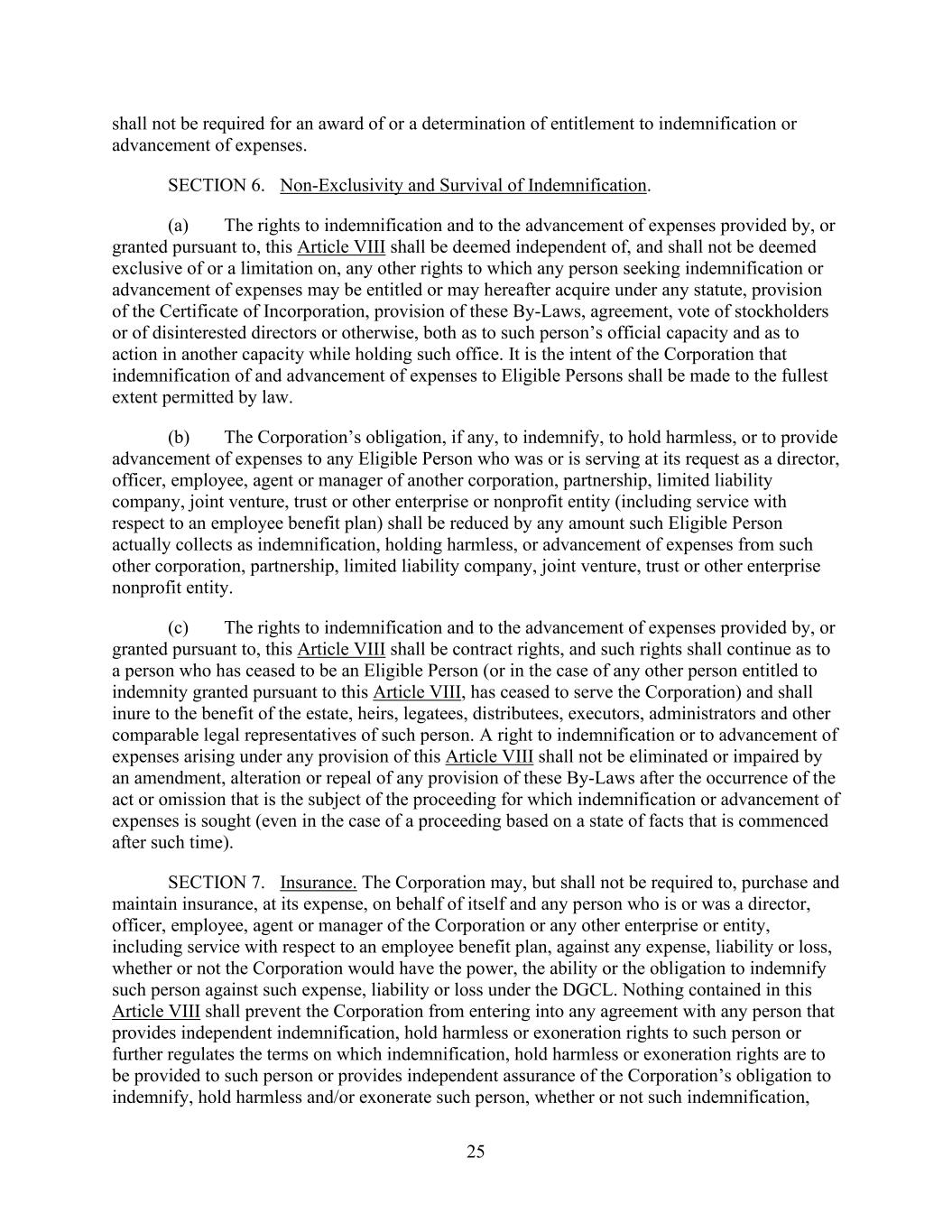
25 shall not be required for an award of or a determination of entitlement to indemnification or advancement of expenses. SECTION 6. Non-Exclusivity and Survival of Indemnification. (a) The rights to indemnification and to the advancement of expenses provided by, or granted pursuant to, this Article VIII shall be deemed independent of, and shall not be deemed exclusive of or a limitation on, any other rights to which any person seeking indemnification or advancement of expenses may be entitled or may hereafter acquire under any statute, provision of the Certificate of Incorporation, provision of these By-Laws, agreement, vote of stockholders or of disinterested directors or otherwise, both as to such person’s official capacity and as to action in another capacity while holding such office. It is the intent of the Corporation that indemnification of and advancement of expenses to Eligible Persons shall be made to the fullest extent permitted by law. (b) The Corporation’s obligation, if any, to indemnify, to hold harmless, or to provide advancement of expenses to any Eligible Person who was or is serving at its request as a director, officer, employee, agent or manager of another corporation, partnership, limited liability company, joint venture, trust or other enterprise or nonprofit entity (including service with respect to an employee benefit plan) shall be reduced by any amount such Eligible Person actually collects as indemnification, holding harmless, or advancement of expenses from such other corporation, partnership, limited liability company, joint venture, trust or other enterprise nonprofit entity. (c) The rights to indemnification and to the advancement of expenses provided by, or granted pursuant to, this Article VIII shall be contract rights, and such rights shall continue as to a person who has ceased to be an Eligible Person (or in the case of any other person entitled to indemnity granted pursuant to this Article VIII, has ceased to serve the Corporation) and shall inure to the benefit of the estate, heirs, legatees, distributees, executors, administrators and other comparable legal representatives of such person. A right to indemnification or to advancement of expenses arising under any provision of this Article VIII shall not be eliminated or impaired by an amendment, alteration or repeal of any provision of these By-Laws after the occurrence of the act or omission that is the subject of the proceeding for which indemnification or advancement of expenses is sought (even in the case of a proceeding based on a state of facts that is commenced after such time). SECTION 7. Insurance. The Corporation may, but shall not be required to, purchase and maintain insurance, at its expense, on behalf of itself and any person who is or was a director, officer, employee, agent or manager of the Corporation or any other enterprise or entity, including service with respect to an employee benefit plan, against any expense, liability or loss, whether or not the Corporation would have the power, the ability or the obligation to indemnify such person against such expense, liability or loss under the DGCL. Nothing contained in this Article VIII shall prevent the Corporation from entering into any agreement with any person that provides independent indemnification, hold harmless or exoneration rights to such person or further regulates the terms on which indemnification, hold harmless or exoneration rights are to be provided to such person or provides independent assurance of the Corporation’s obligation to indemnify, hold harmless and/or exonerate such person, whether or not such indemnification,
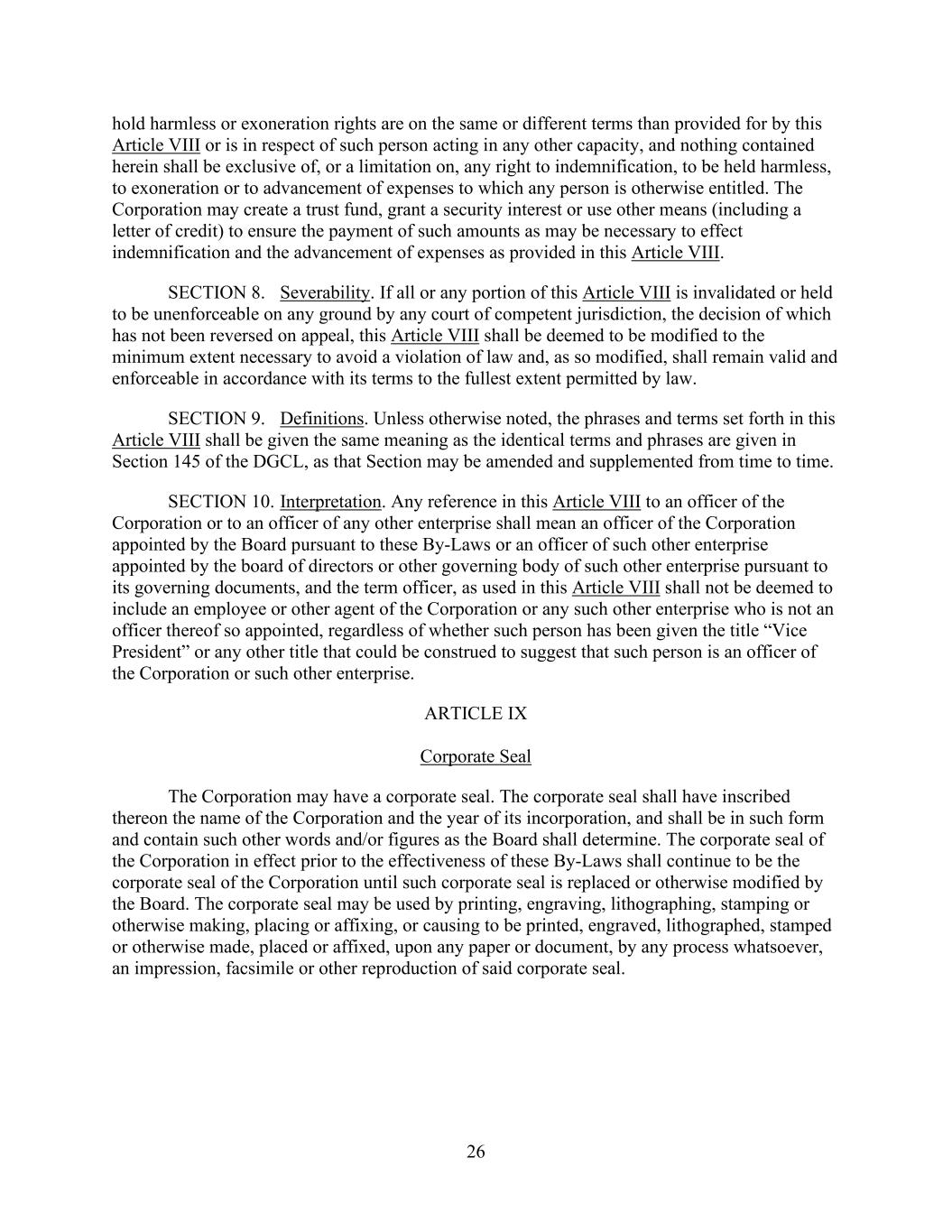
26 hold harmless or exoneration rights are on the same or different terms than provided for by this Article VIII or is in respect of such person acting in any other capacity, and nothing contained herein shall be exclusive of, or a limitation on, any right to indemnification, to be held harmless, to exoneration or to advancement of expenses to which any person is otherwise entitled. The Corporation may create a trust fund, grant a security interest or use other means (including a letter of credit) to ensure the payment of such amounts as may be necessary to effect indemnification and the advancement of expenses as provided in this Article VIII. SECTION 8. Severability. If all or any portion of this Article VIII is invalidated or held to be unenforceable on any ground by any court of competent jurisdiction, the decision of which has not been reversed on appeal, this Article VIII shall be deemed to be modified to the minimum extent necessary to avoid a violation of law and, as so modified, shall remain valid and enforceable in accordance with its terms to the fullest extent permitted by law. SECTION 9. Definitions. Unless otherwise noted, the phrases and terms set forth in this Article VIII shall be given the same meaning as the identical terms and phrases are given in Section 145 of the DGCL, as that Section may be amended and supplemented from time to time. SECTION 10. Interpretation. Any reference in this Article VIII to an officer of the Corporation or to an officer of any other enterprise shall mean an officer of the Corporation appointed by the Board pursuant to these By-Laws or an officer of such other enterprise appointed by the board of directors or other governing body of such other enterprise pursuant to its governing documents, and the term officer, as used in this Article VIII shall not be deemed to include an employee or other agent of the Corporation or any such other enterprise who is not an officer thereof so appointed, regardless of whether such person has been given the title “Vice President” or any other title that could be construed to suggest that such person is an officer of the Corporation or such other enterprise. ARTICLE IX Corporate Seal The Corporation may have a corporate seal. The corporate seal shall have inscribed thereon the name of the Corporation and the year of its incorporation, and shall be in such form and contain such other words and/or figures as the Board shall determine. The corporate seal of the Corporation in effect prior to the effectiveness of these By-Laws shall continue to be the corporate seal of the Corporation until such corporate seal is replaced or otherwise modified by the Board. The corporate seal may be used by printing, engraving, lithographing, stamping or otherwise making, placing or affixing, or causing to be printed, engraved, lithographed, stamped or otherwise made, placed or affixed, upon any paper or document, by any process whatsoever, an impression, facsimile or other reproduction of said corporate seal.
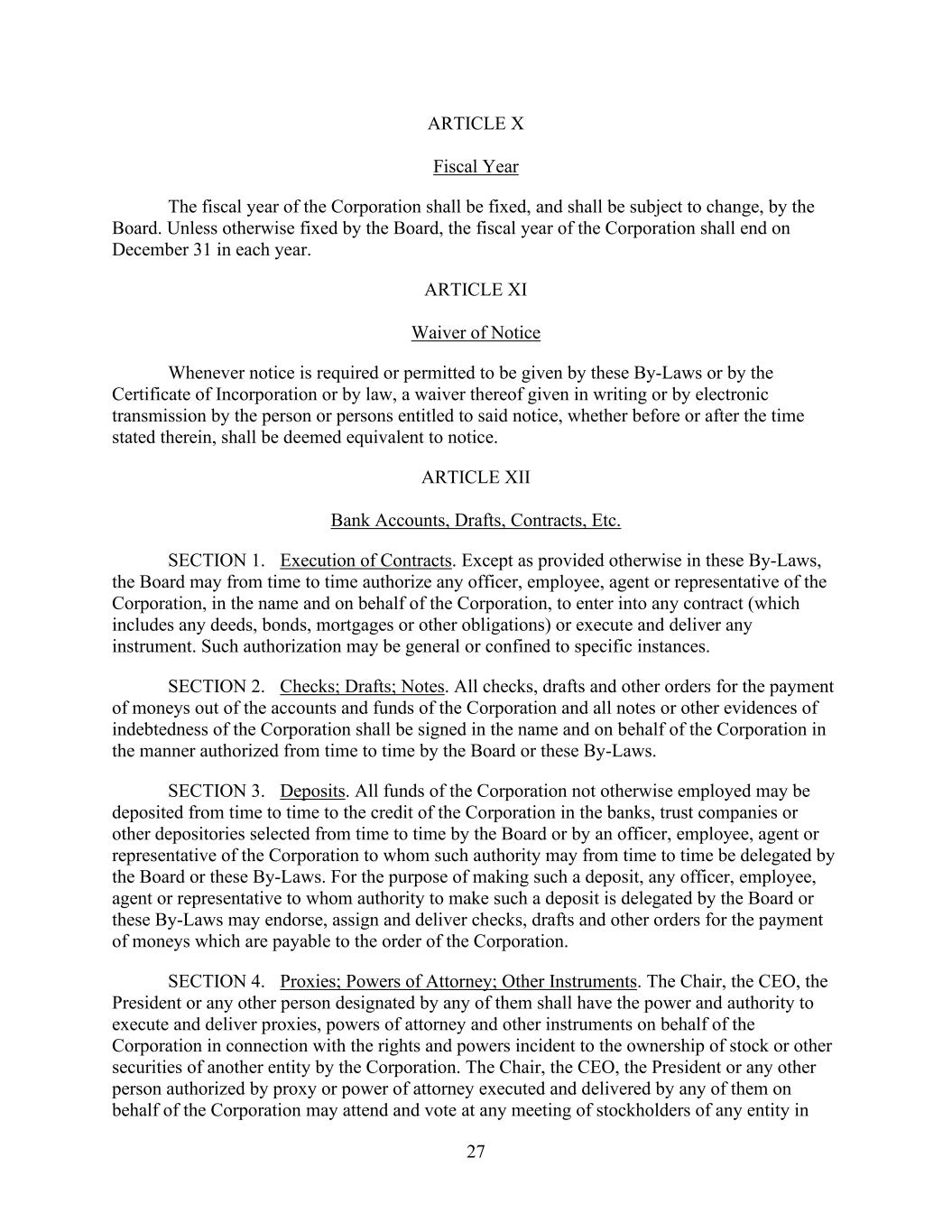
27 ARTICLE X Fiscal Year The fiscal year of the Corporation shall be fixed, and shall be subject to change, by the Board. Unless otherwise fixed by the Board, the fiscal year of the Corporation shall end on December 31 in each year. ARTICLE XI Waiver of Notice Whenever notice is required or permitted to be given by these By-Laws or by the Certificate of Incorporation or by law, a waiver thereof given in writing or by electronic transmission by the person or persons entitled to said notice, whether before or after the time stated therein, shall be deemed equivalent to notice. ARTICLE XII Bank Accounts, Drafts, Contracts, Etc. SECTION 1. Execution of Contracts. Except as provided otherwise in these By-Laws, the Board may from time to time authorize any officer, employee, agent or representative of the Corporation, in the name and on behalf of the Corporation, to enter into any contract (which includes any deeds, bonds, mortgages or other obligations) or execute and deliver any instrument. Such authorization may be general or confined to specific instances. SECTION 2. Checks; Drafts; Notes. All checks, drafts and other orders for the payment of moneys out of the accounts and funds of the Corporation and all notes or other evidences of indebtedness of the Corporation shall be signed in the name and on behalf of the Corporation in the manner authorized from time to time by the Board or these By-Laws. SECTION 3. Deposits. All funds of the Corporation not otherwise employed may be deposited from time to time to the credit of the Corporation in the banks, trust companies or other depositories selected from time to time by the Board or by an officer, employee, agent or representative of the Corporation to whom such authority may from time to time be delegated by the Board or these By-Laws. For the purpose of making such a deposit, any officer, employee, agent or representative to whom authority to make such a deposit is delegated by the Board or these By-Laws may endorse, assign and deliver checks, drafts and other orders for the payment of moneys which are payable to the order of the Corporation. SECTION 4. Proxies; Powers of Attorney; Other Instruments. The Chair, the CEO, the President or any other person designated by any of them shall have the power and authority to execute and deliver proxies, powers of attorney and other instruments on behalf of the Corporation in connection with the rights and powers incident to the ownership of stock or other securities of another entity by the Corporation. The Chair, the CEO, the President or any other person authorized by proxy or power of attorney executed and delivered by any of them on behalf of the Corporation may attend and vote at any meeting of stockholders of any entity in
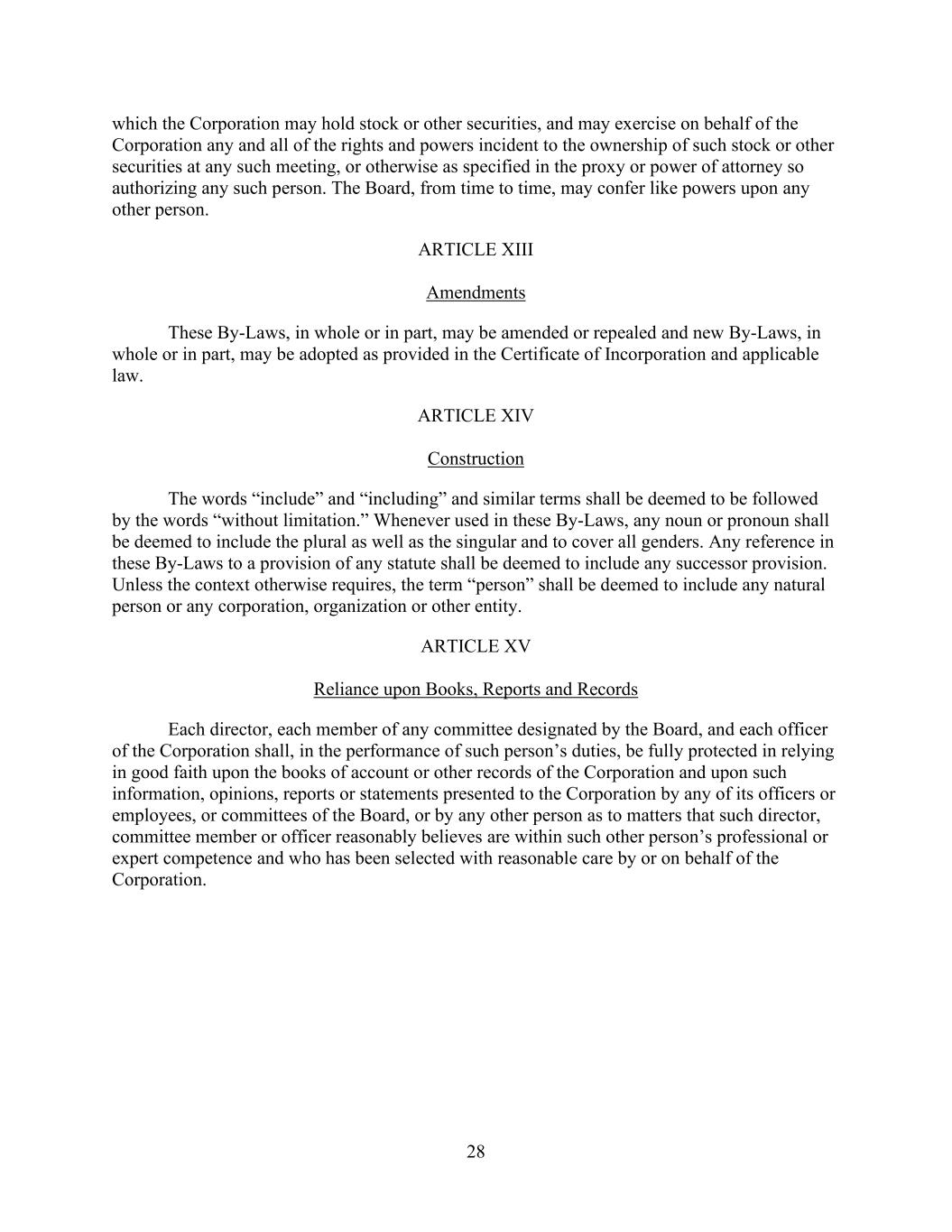
28 which the Corporation may hold stock or other securities, and may exercise on behalf of the Corporation any and all of the rights and powers incident to the ownership of such stock or other securities at any such meeting, or otherwise as specified in the proxy or power of attorney so authorizing any such person. The Board, from time to time, may confer like powers upon any other person. ARTICLE XIII Amendments These By-Laws, in whole or in part, may be amended or repealed and new By-Laws, in whole or in part, may be adopted as provided in the Certificate of Incorporation and applicable law. ARTICLE XIV Construction The words “include” and “including” and similar terms shall be deemed to be followed by the words “without limitation.” Whenever used in these By-Laws, any noun or pronoun shall be deemed to include the plural as well as the singular and to cover all genders. Any reference in these By-Laws to a provision of any statute shall be deemed to include any successor provision. Unless the context otherwise requires, the term “person” shall be deemed to include any natural person or any corporation, organization or other entity. ARTICLE XV Reliance upon Books, Reports and Records Each director, each member of any committee designated by the Board, and each officer of the Corporation shall, in the performance of such person’s duties, be fully protected in relying in good faith upon the books of account or other records of the Corporation and upon such information, opinions, reports or statements presented to the Corporation by any of its officers or employees, or committees of the Board, or by any other person as to matters that such director, committee member or officer reasonably believes are within such other person’s professional or expert competence and who has been selected with reasonable care by or on behalf of the Corporation.




























